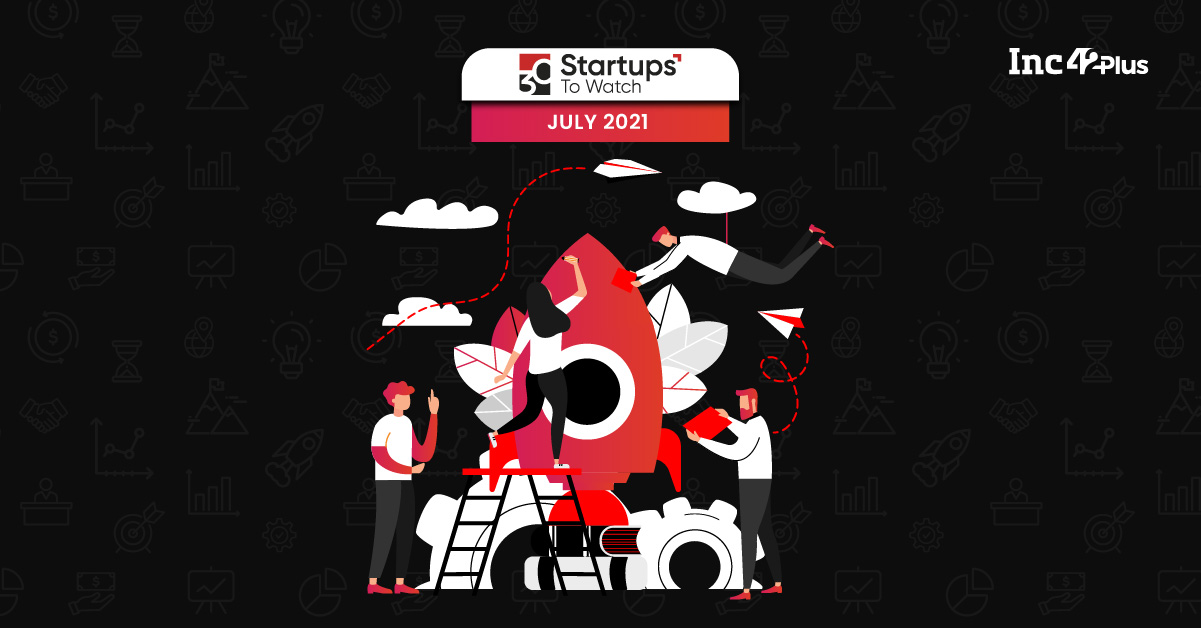Over the past 17 editions, we have been overwhelmed by the response to the 30 Startups To Watch series. More than 500 early-stage companies have been featured here, and many of them have progressed to raise big rounds. Some of them have even been acquired.
In the past few months, we have been delighted to know how investors found suitable startups through this list and vice-versa. Looking at this and as a way to give back to the community, we have decided to keep this edition as a ‘free read’ for everyone to accelerate the impact and help more startups get discovered!
As we sat down to shortlist the startups for July, we wanted to highlight many upcoming companies whose products and services are geared towards what is now frequently mentioned as the new normal. Such solutions are most suitable for digital-first ecosystems where technology rules the roost. Because (let us face it), we may keep emerging from multiple lockdowns, but we are not likely to return to the analogue way of life as we knew it before the pandemic struck.
30 Startups To Watch: July 2021
In July, we took a deep dive into early-stage startups whose solutions are tailored to provide people and businesses quick and easy access. This is not surprising as the Covid-19 crisis has pushed the country towards digital literacy and hastened its adoption across businesses of all sizes.
In this list, we have startups helping salespeople turn into micro-entrepreneurs while SMBs, solopreneurs and wholesalers in Tier 2 and Tier 3 cities are amply supported to make data-driven decisions for business growth. But these are inclusive growth stories and also benefit big companies seeking a firm footing in the non-metro markets and beyond.
We have startups in the EV-charging space, trying to grab the first-mover advantage by tapping into an infra segment that remains largely unaddressed. Then there are a few sector-specific HRtech companies addressing the pain points of recruiters and candidates or those providing upskilling opportunities to future leaders. We have also featured many startups in the health and fitness space that go deep into R&D and smart technology to help people (and pets).
Interestingly, all the startups listed here are less than three years old. But the way most of them have built a significant clientele shows the relevance of their solutions in the current scenario.
Check out the 18th edition of Inc42 Plus’ 30 Startups To Watch list.
Editor’s Note: The list below is not meant to be a ranking of any kind. We have listed the startups in alphabetical order.
Answer Genomics
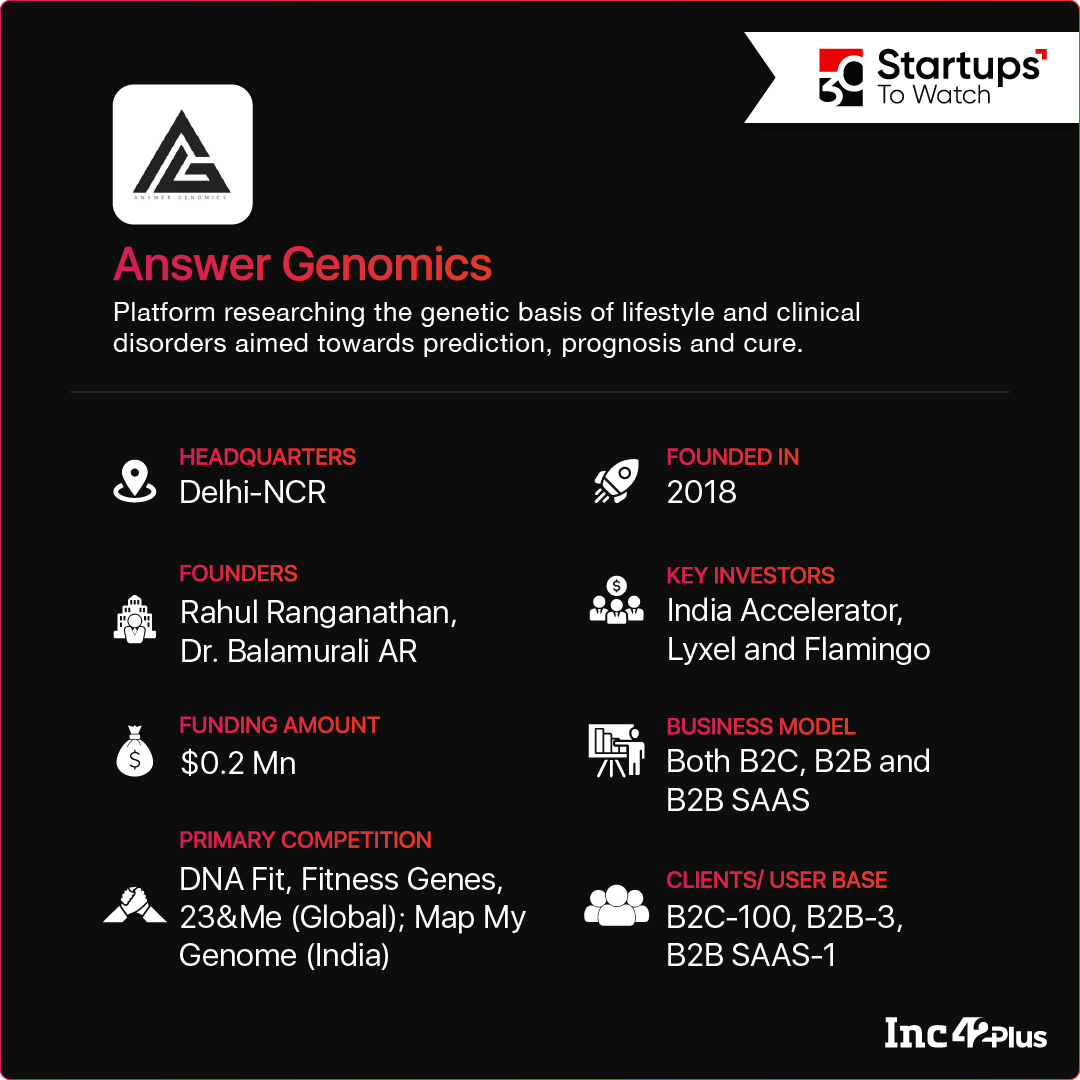
Why Answer Genomics Made It To The List
Lifestyle diseases like obesity, diabetes and hypertension can put a huge burden on the traditional healthcare infrastructure. However, many of these medical conditions (or the chances of developing them) can be tracked quite early through genomics or genetic analysis as they tend to be hereditary. Decoding an individual’s hereditary/congenital disorders also goes a long way in preventing comorbidities.
To support preventive care for genetic problems, New Delhi-based Answer Genomics was set up in 2018 and became operational in June this year. The genetic research startup uses machine learning to study the genetic codes of lifestyle diseases and other medical disorders for prediction, prognosis and cure. The company analyses multiple data points such as lifestyle, medical history, physical parameters, blood sample analysis and genetic issues to diagnose and treat health concerns accurately. It targets individuals aged above 25, especially those trying to boost their immunity levels, enhance overall fitness and improve gut health. Its SaaS-based nutrition recommendation system is currently awaiting a patent.
The startup has in place both B2C and B2B (corporate clients) subscription models. It also offers wellness organisations and clinics access to its SaaS-based diagnostic solution for a subscription fee.
As of now, Answer Genomics wants to focus on data security and ensure continuous validation of existing genomic-phenomic associations to identify new disease-nutritional deficiency patterns. In the long term, it wants to work with pharmaceutical partners and further focus on identifying genomic and lifestyle factors that can lead to prompt diagnosis and better treatment options.
Apnaklub
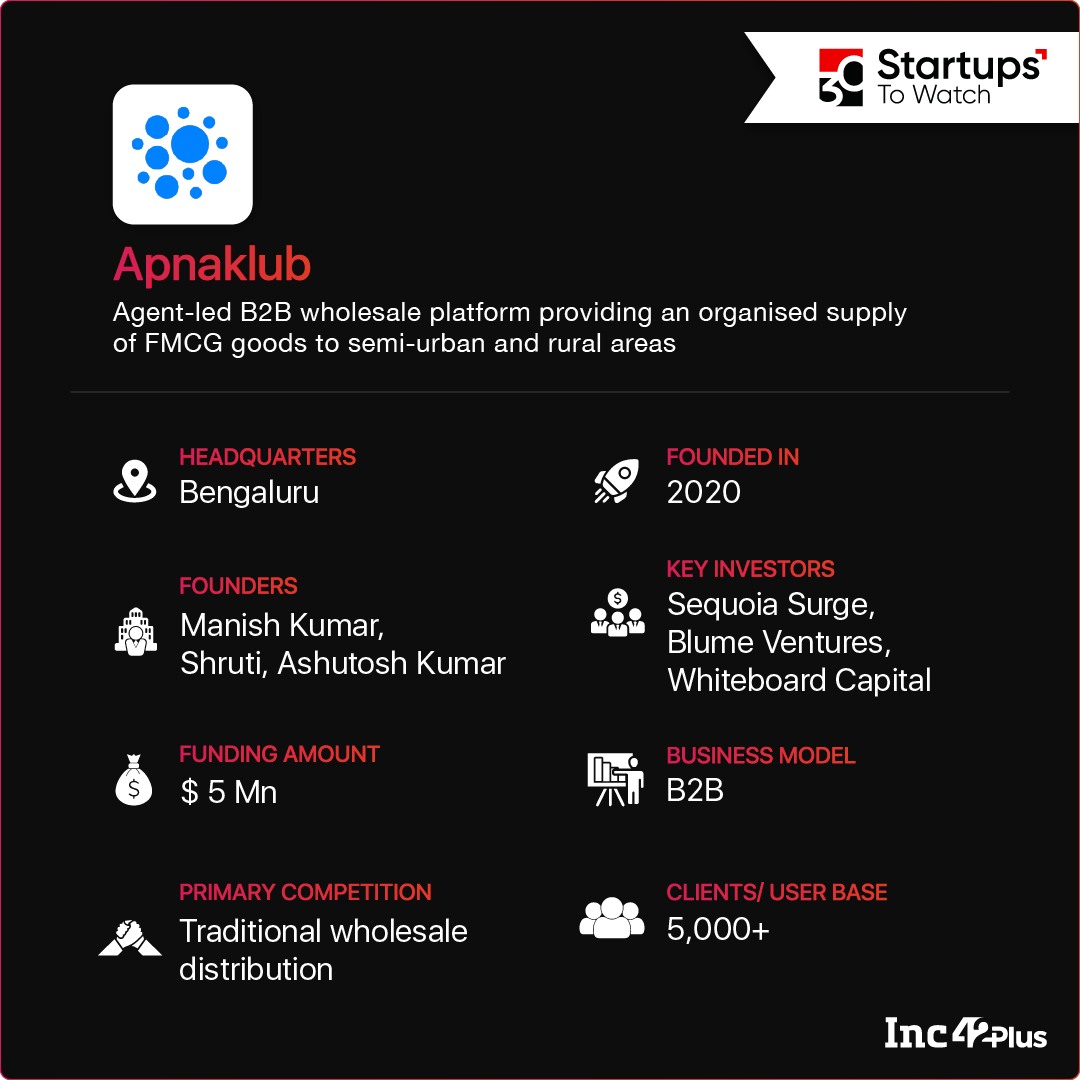
Why Apnaklub Made It To The List
India is home to more than 800 direct-to-consumer (D2C) startups and a slew of legacy brands in the fast-moving consumer goods (FMCG) space. The country is now witnessing a full-blown incumbent-disruptor battle for a $26 Bn market, growing significantly even in post-pandemic times. While operating in big cities, these FMCG brands have a fair idea of their consumer base, thanks to large-scale online shopping and massive social media engagement. But exploring new markets in smaller towns and beyond requires tapping into kirana channels for effective retail distribution. In fact, around 50 Mn people across the country are in sales commission-based job roles to expand the FMCG business in rural India, and Bengaluru-based Apnaklub is addressing this market.
Launched in 2020, Apnaklub has developed a wholesaler agent-led B2B platform for FMCG brands’ business expansion. It also aims to help people set up hyperlocal micro-distribution businesses and ensure better profit margins, access to a large assortment of brands and SKUs and a steady supply of goods. In essence, the startup connects a host of kirana shops and general stores in India’s semi-urban and rural areas to a wide range of consumer goods and brands via its network of digitally connected wholesale partners. The company earns a commission on each order fulfilled through its network and claims that it is witnessing double-digit sales growth in 2021.
Apnaklub is also planning to provide pricing and market intelligence data to small and large brands alike. It is now growing the ApnaKlub Partner Program, a network that currently includes more than 5,000 ‘digitally enabled’ wholesaler partners. These partners get personalised training and adequate support to create sustainable wholesale businesses for themselves and earn a commission on each order they fulfil. In the long term, Apnaklub’s mission is to create livelihood opportunities in Tier 2 and Tier 3 markets and beyond.
Bandhoo
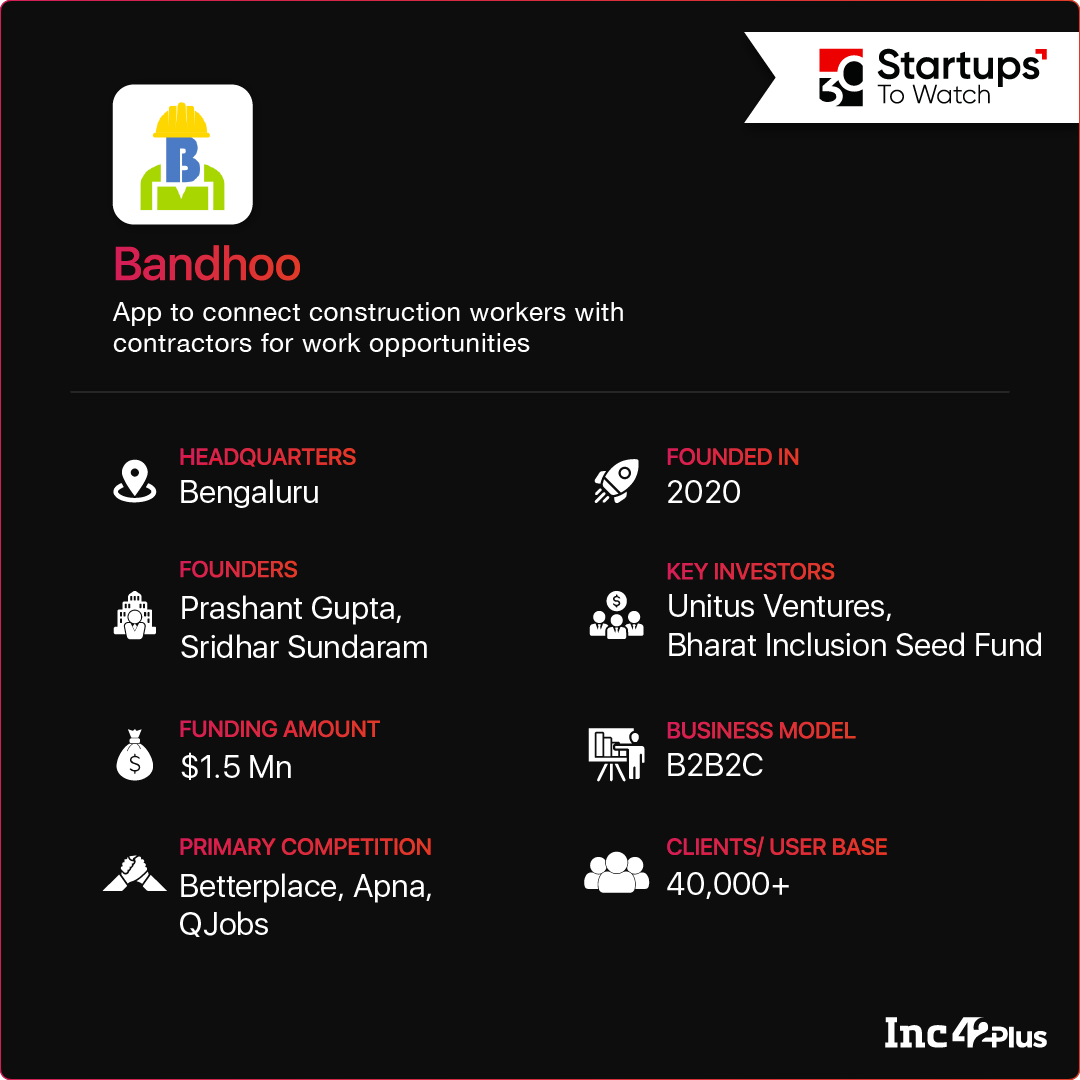
Why Bandhoo Made It To The List
The initial days of the pandemic and lockdowns saw the real estate sector lose the majority of its workforce as migrant workers were compelled to go home. When the reopening happened and restrictions were relaxed, both construction workers and real estate companies suffered as they could not connect promptly to leverage the most suitable opportunities.
According to a report by the Centre for Monitoring Indian Economy (CMIE), the real estate and construction industry saw employment shrink by 8.8 Mn in April-May 2021 from a base of about 64 Mn in March 2021 due to the lack of efficient means to source opportunities effectively during the second wave of the Covid-19 pandemic. Bengaluru-based Bandhoo’s HRtech platform connects people with relevant job openings across the country to deal with this sad state of affairs.
Started in 2020, Bandhoo works closely with real estate, infrastructure and construction companies, building materials suppliers and construction workers to make the real estate labour market more transparent. Its target candidate base covers blue-collar gig workers like masons, painters, welders, electricians and crane and JCB operators who travel from project to project, as is the nature of real estate work.
To find suitable gig workers at the earliest, businesses can register their requirements on Bandhoo, and the company will match those job openings with candidates through its app and WhatsApp outreach. It also provides smartphones to deserving candidates to ensure better job-searching.
Bandhoo has not freezed a revenue model yet and is currently working to improve its market reach. It aims to onboard many large real estate and infrastructure companies, about 100 builders, 1 Lakh SME construction contractors (7,400+ at present) and more than 1.5 Lakh construction workers (35,000+ at present) by 2022–23.
Bikry
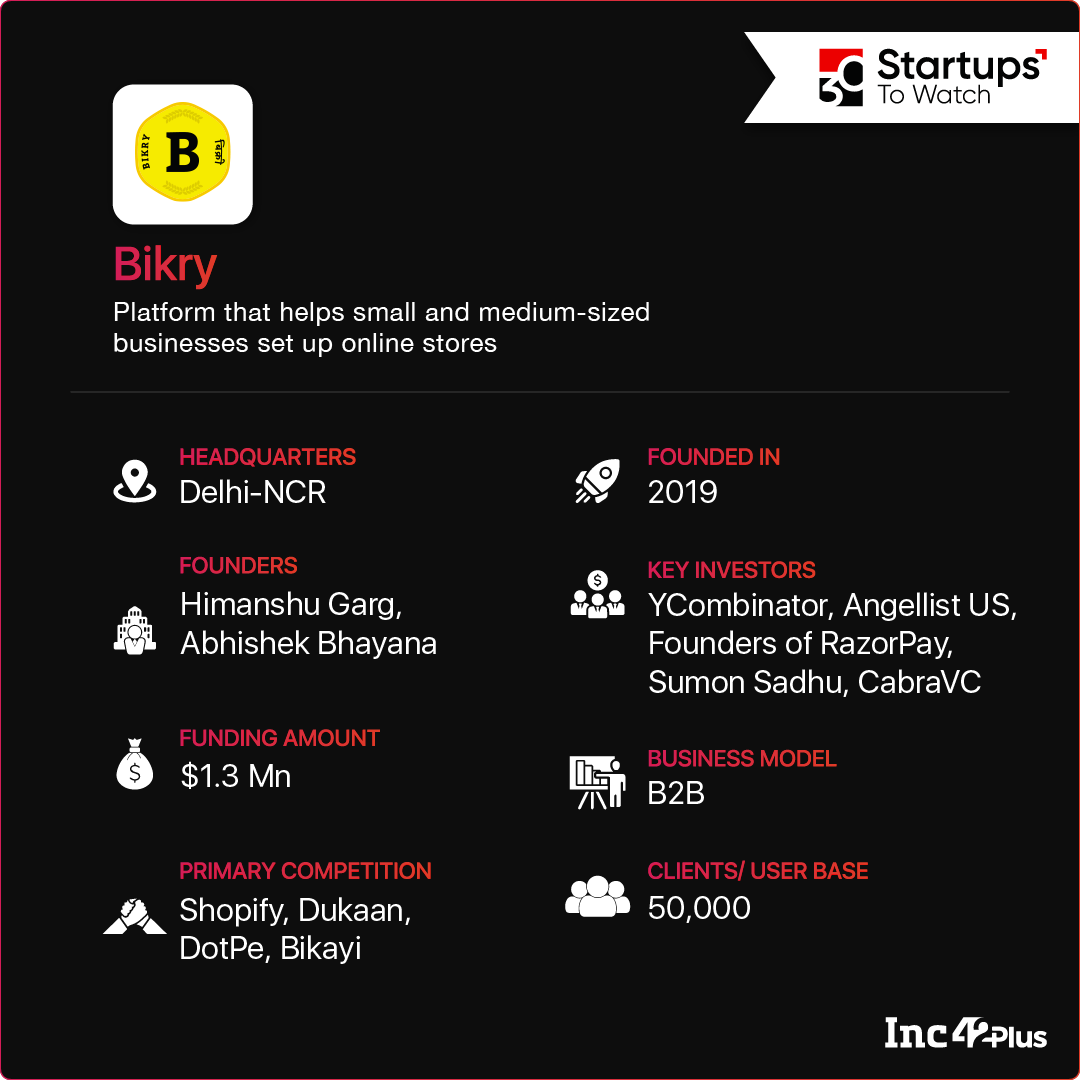
Why Bikry Made It To The List
In the past year and a half, frequent lockdowns have been an eye-opener for small and single-owner businesses as to why they should have a digital presence. But how can a plumber or a small electronics repair shop manage the resources to build an online business? New Delhi-based Bikry has an affordable solution to help businesses out of this business continuity crisis.
The Bikry app was developed in 2019 to help people start their professional-looking online store or e-commerce website and catalogue for free. The company caters to kirana stores, pharmacies, salons and restaurants besides carpenters, plumbers, working moms and many others, helping them get more business via online storefronts, enabling digital payments and ensuring order fulfilment through 35+ shipping partners.
Bikry has a freemium model in place, and users can pay as little as INR 250 a month to customise their websites and apps. At present, it claims to service more than 50,000 retailers and plans to set up digital stores for 1 Mn+ merchants at the earliest.
Bookee
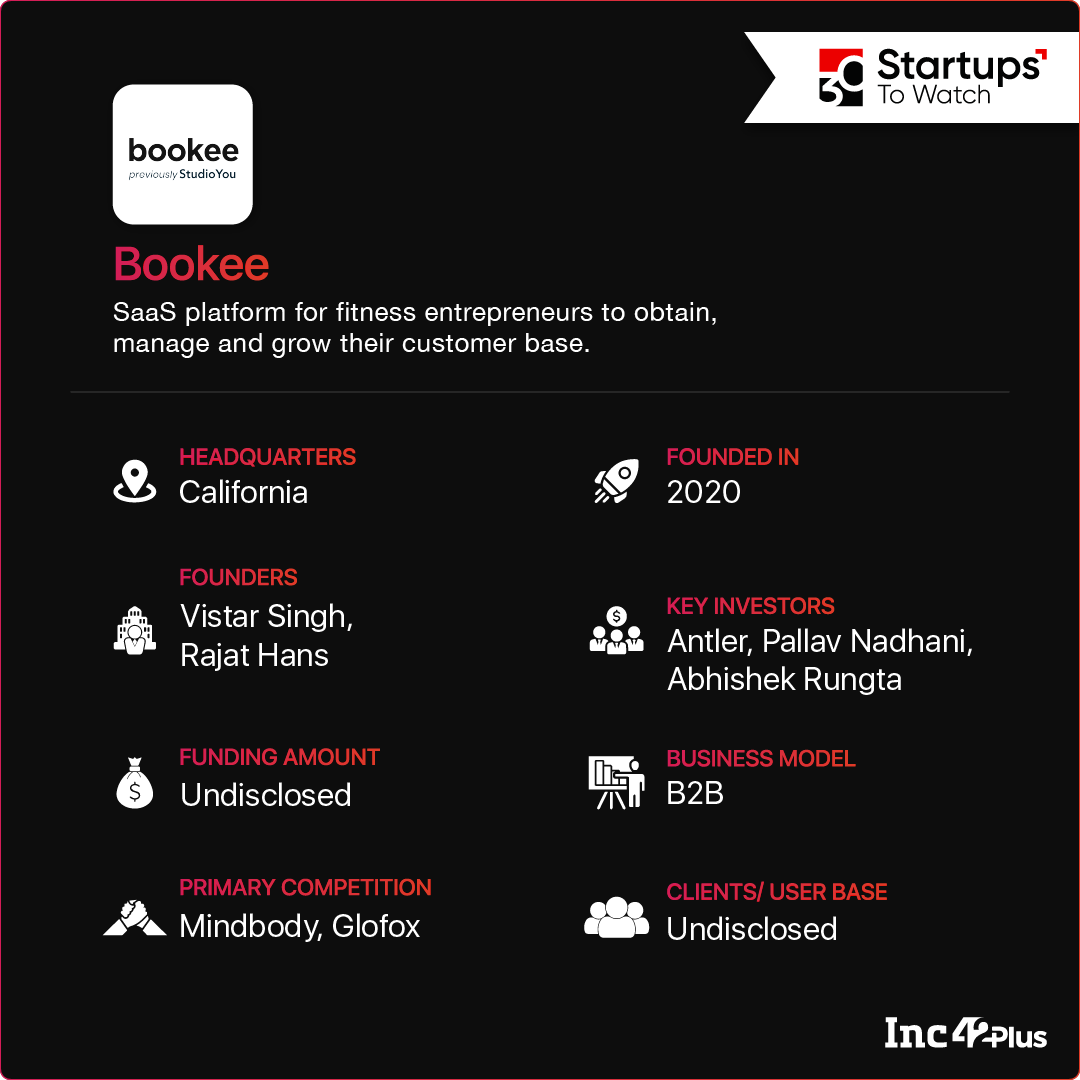
Why Bookee Made It To The List
Fitness entrepreneurs worldwide are increasingly finding relevance as part of one’s daily routine as more and more people are turning to online fitness classes during the Covid-19 pandemic. The growing traction is good news for businesses, but most entrepreneurs, especially solo entrepreneurs, find it challenging to juggle multiple tech tools to manage customer bookings, payments, training programmes and other essential business activities. Noticing this operational inconvenience, California-based Bookee spent around six months researching every tech tool that fitness businesses used and finally developed a comprehensive SaaS alternative that combined value-added services with operational ease.
Launched in 2020, Bookee targets boutique fitness studios and gyms globally, especially those with a presence in the US (primary market), Switzerland, Italy and Australia. The pure-play SaaS solution is available for a monthly subscription and includes end-to-end functions such as customer appointment and event scheduling, cross-selling of services, building engagement with prospective customers, enabling digital payments and more.
The company is currently hiring for sales roles to increase its customer base. In the long term, it plans to emerge as the world’s biggest fitness entrepreneurship company.
Canpe Solutions
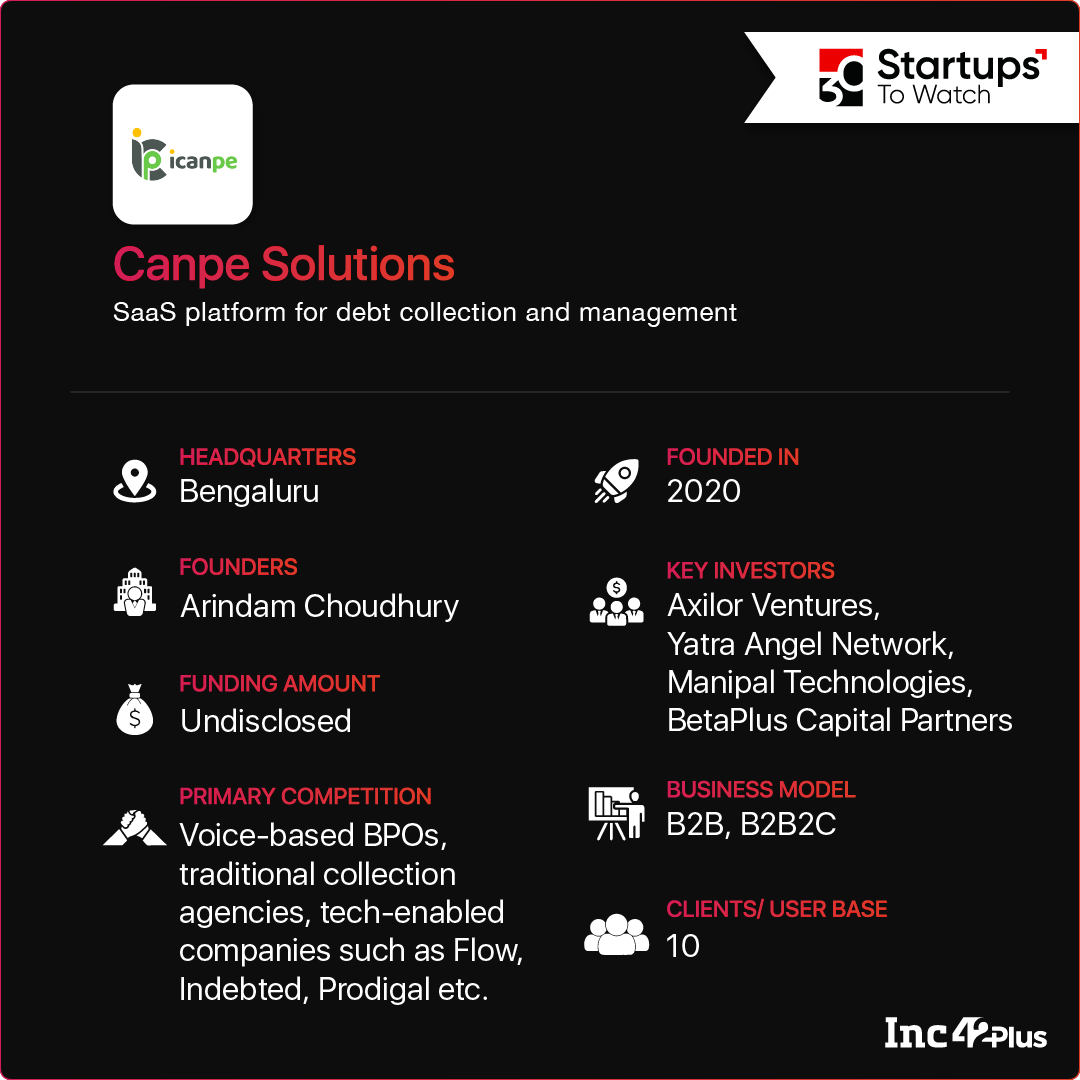
Why Canpe Solutions Made It To The List
The combined debt collection market in India and Southeast Asia is worth $100 Bn+, but it is largely underserved. However, this scenario is changing due to a significant rise in unsecured loans and delinquencies soaring to 2.5-5x across asset classes compared to the pre-Covid numbers. This also underlines the need for a digital-first debt collection platform, an addressable market opportunity explored by Bengaluru-based fintech startup Canpe.
Started in 2020, Canpe has developed an analytics-driven SaaS platform to manage debt collections efficiently. For instance, its digital engagement and debt collection platform (ICanPe) enables lenders to implement a comprehensive borrower engagement strategy and improve their collections.
The company claims that its collections under management have grown more than 8x in less than six months. It is currently in talks with multiple financial institutions, targeting a spectrum of asset classes, borrowers and loan sizes. Its revenue model is a mix of subscription and debt collection performance-based fees. It is currently fine-tuning and improving its debt collection solutions but wants to expand across fintech verticals in the future.
Charzer
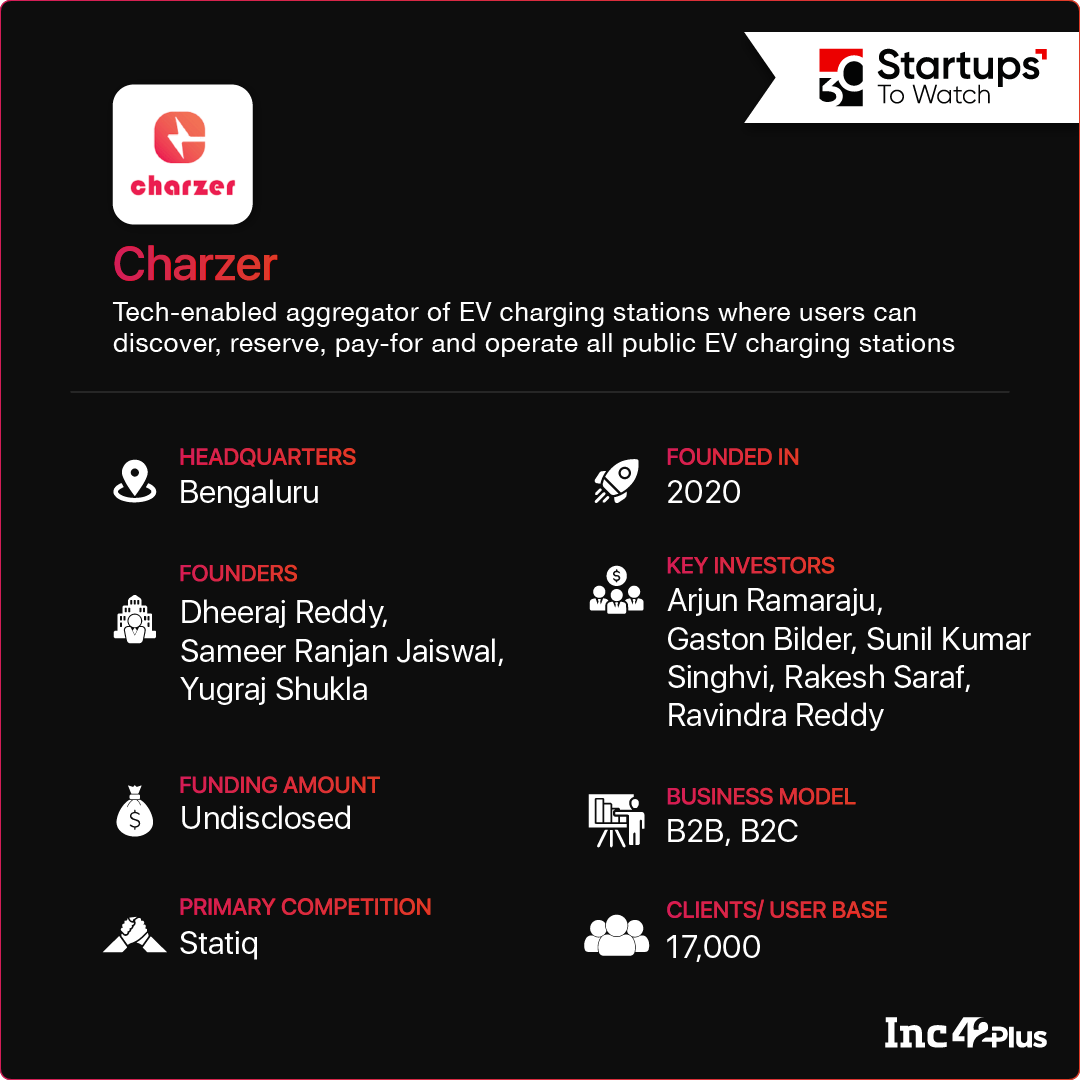
Why Charzer Made It To The List
The Indian market for electric vehicles (EVs) is finally gaining traction due to government interventions. But the lack of pan-India EV-charging infrastructure has hindered the rapid adoption of this technology. A few mobility tech companies are already working in this space, but many more innovators are needed as India is a huge country. Founded in 2020, Bengaluru-based Charzer has also entered this space and aims to deal with the charging woes by providing an asset-light, affordable set-up and creating a network for easy access to public charging stations.
So, what does the startup do? To begin with, it offers a lighter version of the EV charger for INR 3,000. Its flagship product, Kirana Charzer, aims to convert neighbourhood cafeterias, restaurants, malls and mom-and-pop stores into EV charging stations by installing a compact, zero-maintenance and IoT-enabled charging system for INR 15,000 minus overhead expenses. Besides, it is a tech-enabled aggregator that helps users find all public EV charging stations, book charging appointments and pay for the same through its charging network app. In both cases, the company earns a 20% commission on each charging transaction.
The startup also operates as a marketplace where individuals and networks can list their charging stations and start earning revenue if they opt for the Charzer hardware.
As of now, it claims to have installed 650 charging stations and 17,000+ users. By March 2022, it aims to scale up to 5,000 charging stations serving 5.8 Lakh EV owners, and by 2025, it is targeting 2 Lakh charging stations to cater to 38 Lakh EVs across 20 cities.
DigiSparsh
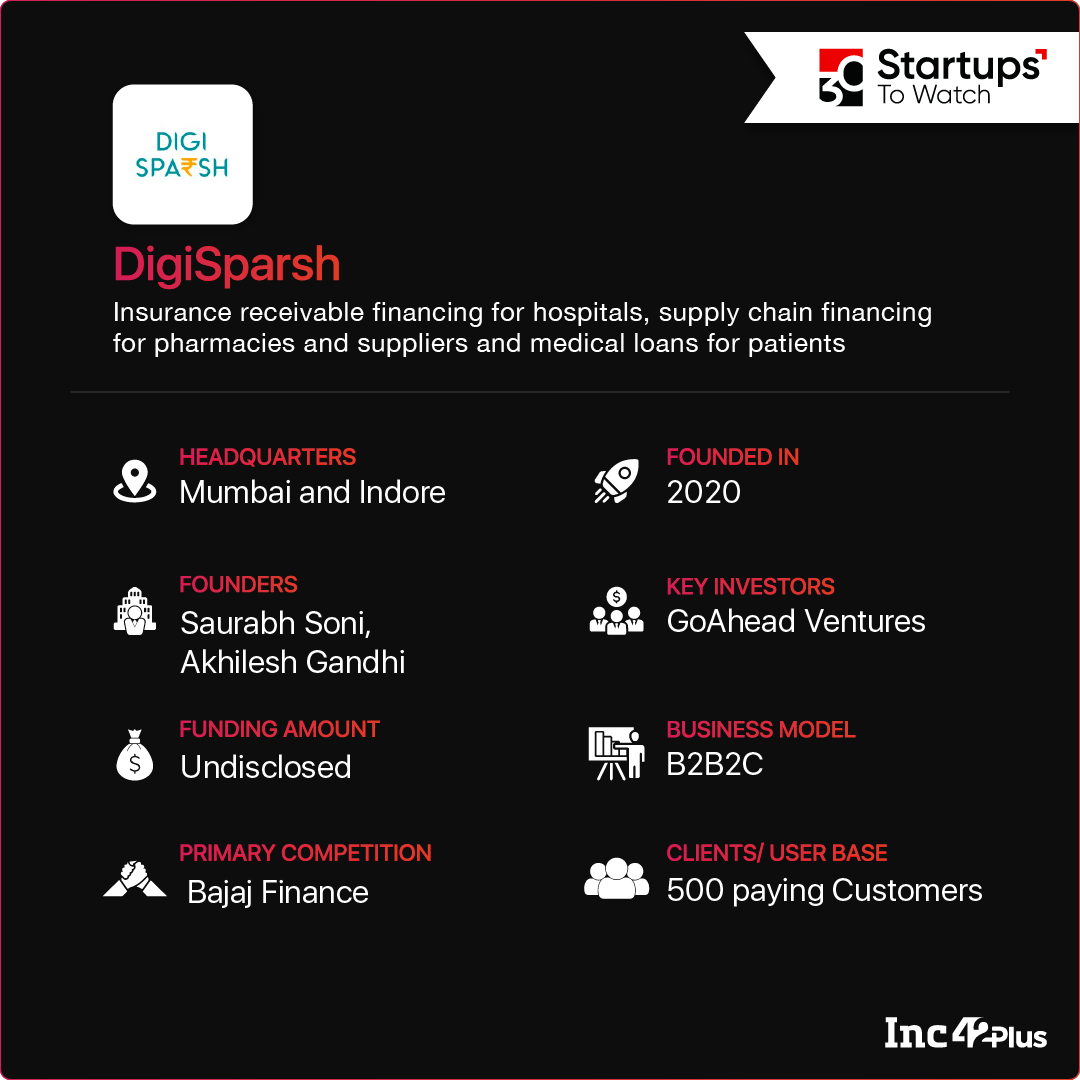
Why DigiSparsh Made It To The List
In a pandemic-hit world, both individuals and medical facilities looked for platforms that could streamline claims processing quickly and efficiently to fulfil their financial requirements at the earliest. Mumbai and Indore-based DigiSparsh is not an insurer, of course, but the company has developed a fintech platform to support the entire healthcare ecosystem, it says.
Simply put, this health fintech firm offers a diverse range of lending solutions such as accounts receivable insurance to unblock working capital for hospitals, supply chain financing for pharmacies and access to healthcare suppliers and interest-free medical loans for patients undergoing critical treatment.
Incidentally, only a few big players operate in the healthcare financing space, and most of the existing companies do not fund the entire value chain. DigiSparsh saw an opportunity there and decided to take the plunge in 2020.
The startup’s B2B2C model involves tying up with healthtech aggregators, which already have hospitals, patients and suppliers as their end customers, and offering bundled financial products to the latter.
Its revenue is generated through commissions from the lenders who provide loans to hospitals, pharmacies and patients. As of now, the company claims to have 500 customers (pharmacies and patients put together),14 hospitals and six aggregators. Its immediate plan is to onboard 100 hospitals by the end of this fiscal year and add 500 more by the end of the next fiscal.
EDGENeural.ai
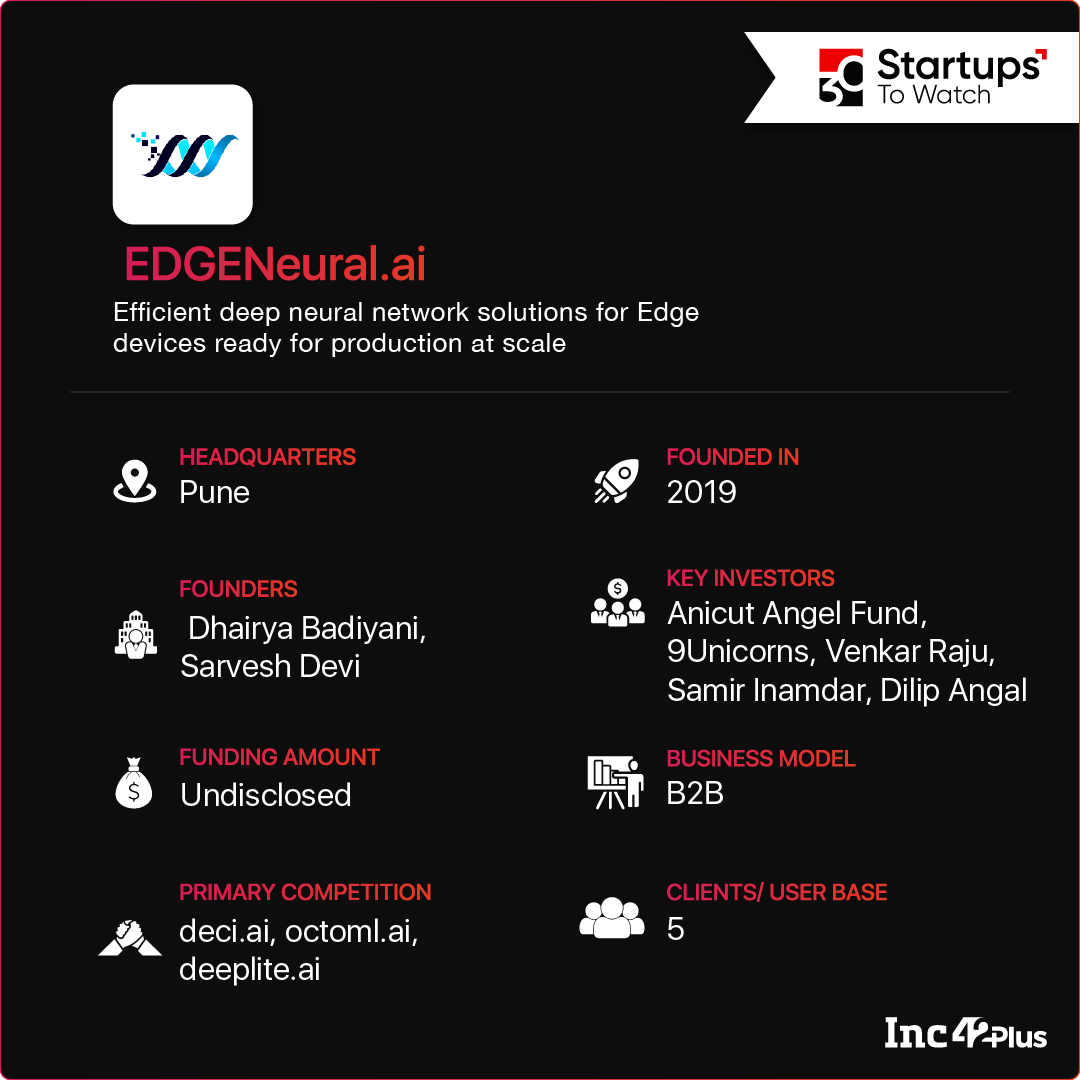
Why EDGENeural.ai Made It To The List
Edge computing is all about staying close to data activities for faster operations instead of running everything through centralised control. It also means edge devices can easily provide access to an enterprise’s/service provider’s core networks such as routers, integrated access devices, multiplexers and more, widely in use by digitally driven factories and shop floors. However, increasing workloads and extensive use of advanced technologies such as artificial intelligence (AI) often cause bandwidth problems and latency issues in these devices, leading to critical delays in real-time data applications. Developing suitable AI solutions for ‘smart’ edge devices can also be a complex task due to high costs, extensive time frames and scalability issues. To overcome these snags, Pune-based EDGENeural.ai has come out with its unified, cloud-neutral and hardware-agnostic platform called ENAP.
Set up in 2019, ENAP provides Artificial Intelligence-As-A-Service (AIaaS) and enables automated development of deep neural network solutions for edge devices, ready for production at scale. It will also help engineers and developers train, optimise, deploy and manage edge AI neural networks quickly and efficiently without going into a cost overrun. The startup claims that it has speeded up the development of edge AI products by 5x, brought down the cost of application by 75% and optimised latency by up to 7x. As of now, it is the only business entity in India that builds an end-to-end workflow solution with the focus on improving AI algorithms and models for edge devices, the company says.
EDGENeural caters to big enterprises and SMBs looking for/providing edge-specific AI solutions minus the ‘cloud’ operations to achieve better results and reduce costs.
Currently, its revenue comes from subscription-based AIaaS at the B2B level, but the platform will eventually go for a subscription model where developers building edgeAI products and solutions will be paying. It also aims to partner with AI chip makers, hardware vendors, system integrators and communication service providers.
Farmako
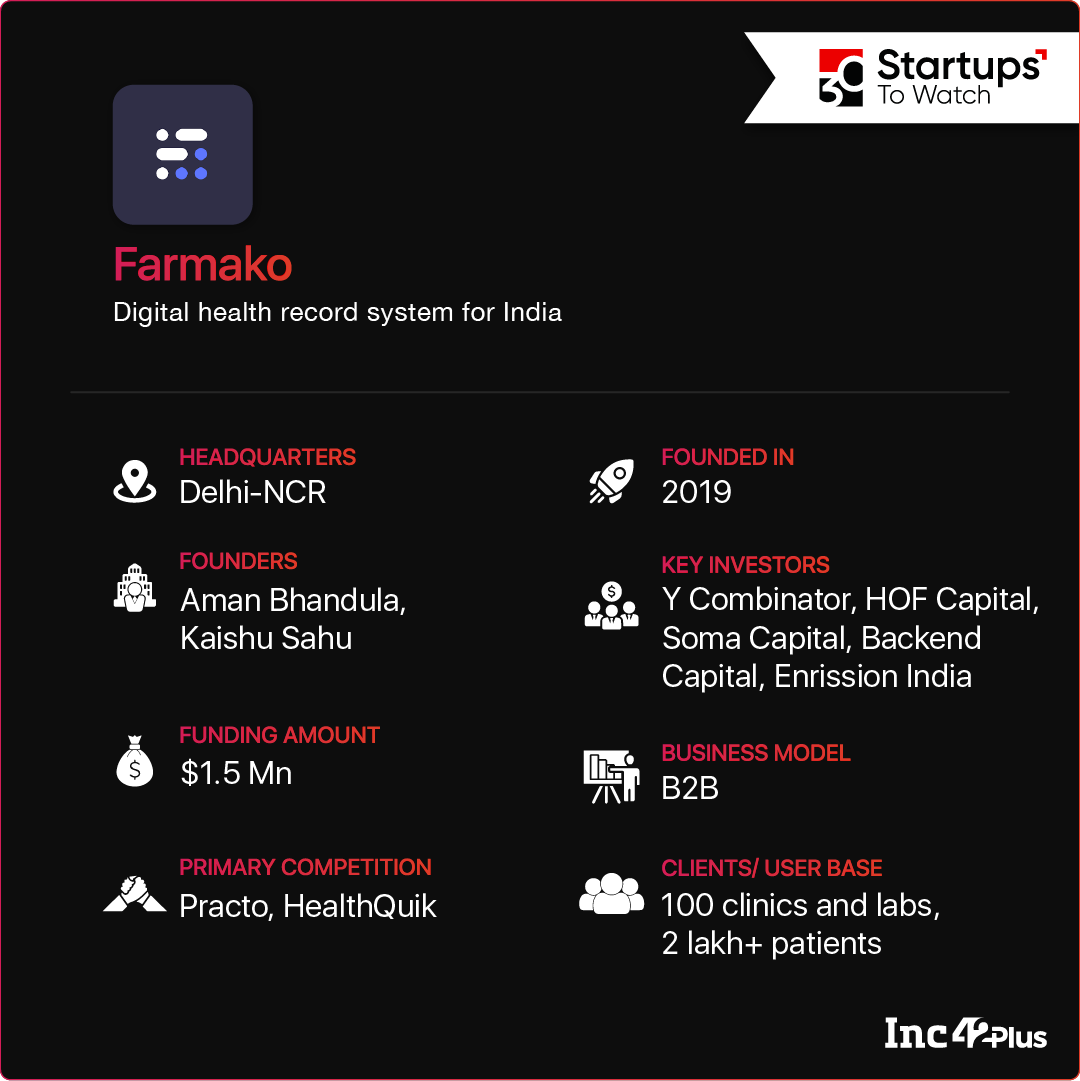
Why Farmako Made It To The List
The Indian government has rolled out several measures to digitise health records, and many startups have come on board to offer connected health record solutions. One of them is Noida-based Farmako that addresses accessibility issues and ensures fast data transfer securely.
Launched in 2019, the medtech company services doctors’ clinics and diagnostic labs and allows them to send health records to their respective patients via its electronic medical record (EMR) app. The records sent via the Farmako app get added to patients’ medical history, and they also get Health IDs from the company for on-demand access to medical records. Besides, patients get connected to these labs and clinics on WhatsApp for fast and effective communications. As of now, its user base is limited to Delhi-NCR, but the startup is tapping into other Tier 1 and Tier 2 markets.
The startup charges a monthly subscription from clinics and labs, but patients are not charged anything for medical record transfers and WhatsApp linking. Going ahead, it will help patients book lab tests and doctors’ appointments through WhatsApp for a commission from the healthcare service provider.
Its immediate goal is to onboard most labs and clinics in Delhi-NCR in the next three months. In the long term, Farmako wants to build a health record system for India where everyone will have a structured medical history to share with his/her doctor.
GalaxEye Space
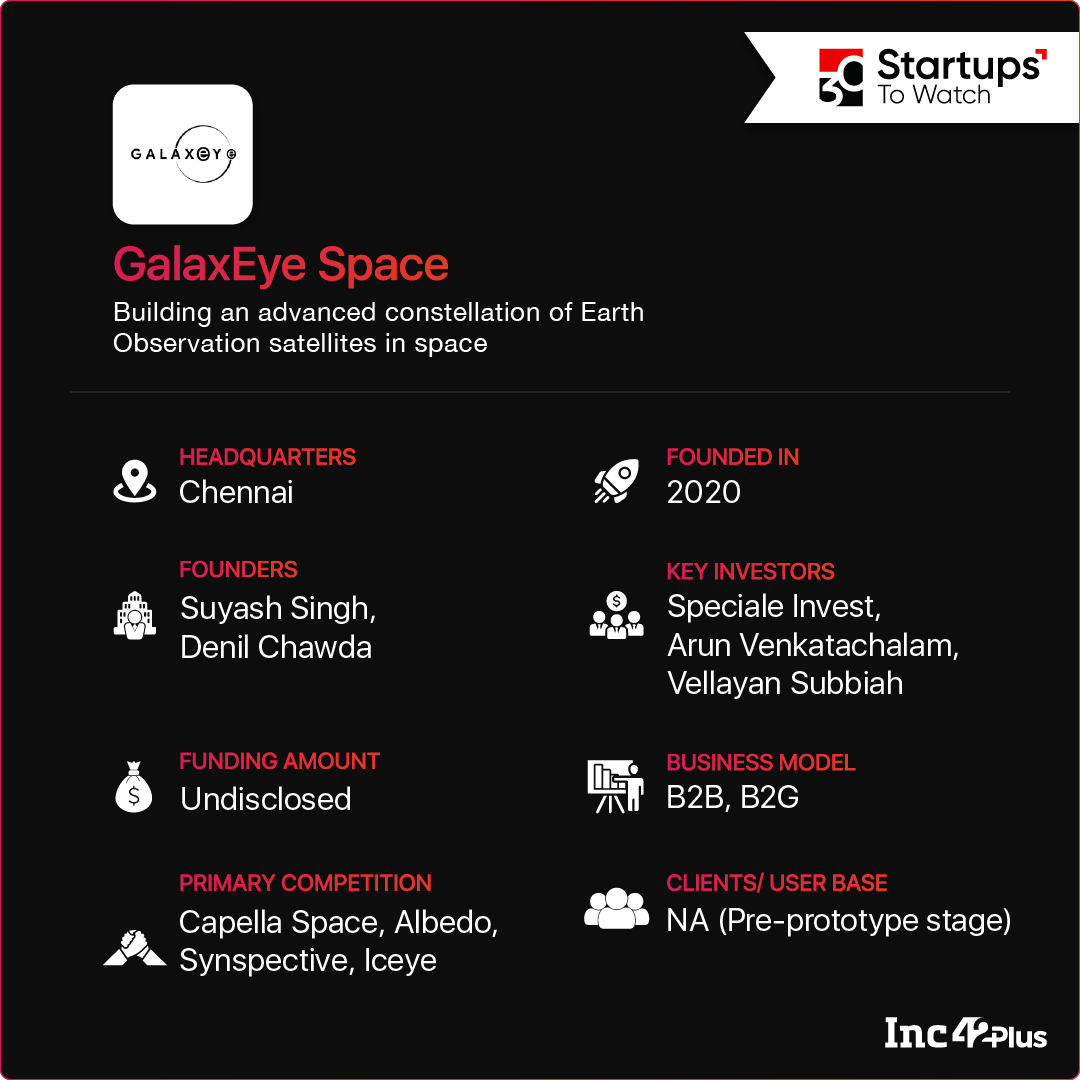 Why GalaxEye Space Made It To The List
Why GalaxEye Space Made It To The List
Jeff Bezos might have taken a short trip to outer space for its novelty, but many nations depend on spacetech for specific requirements. For starters, satellite data is becoming increasingly important for businesses and governments alike to decode natural calamities, security issues and business analytics. So, Chennai-based GalaxEye is now analysing and aligning satellite input to provide more insightful data sets for various usage. Set up at the incubation cell of IIT-Madras in 2020, this startup is the brainchild of a few members from Team Avishkar Hyperloop, one of the top 21 participants out of the 1,600+ contestants that took part in a global competition organised by Elon Musk’s SpaceX.
The startup has realised the gap in the ‘Earth observation’ data provider segment and is currently working on an advanced constellation of Earth observation satellites. It aims to launch its first satellite by early 2023 to derive first-hand data and has a long-term plan of launching more in a phased manner. The company’s immediate goal is to develop and test a prototype of the satellite and its payloads to de-risk the Earth monitoring and satellite image acquisition technologies being developed.
GalaxEye will work in the B2B and B2G space and operate on a subscription-based Data-as-a-Service model. However, its broader vision is to monitor outer space and accelerate the growth of space infrastructure for multi-planetary exploration.
GalaxyCard
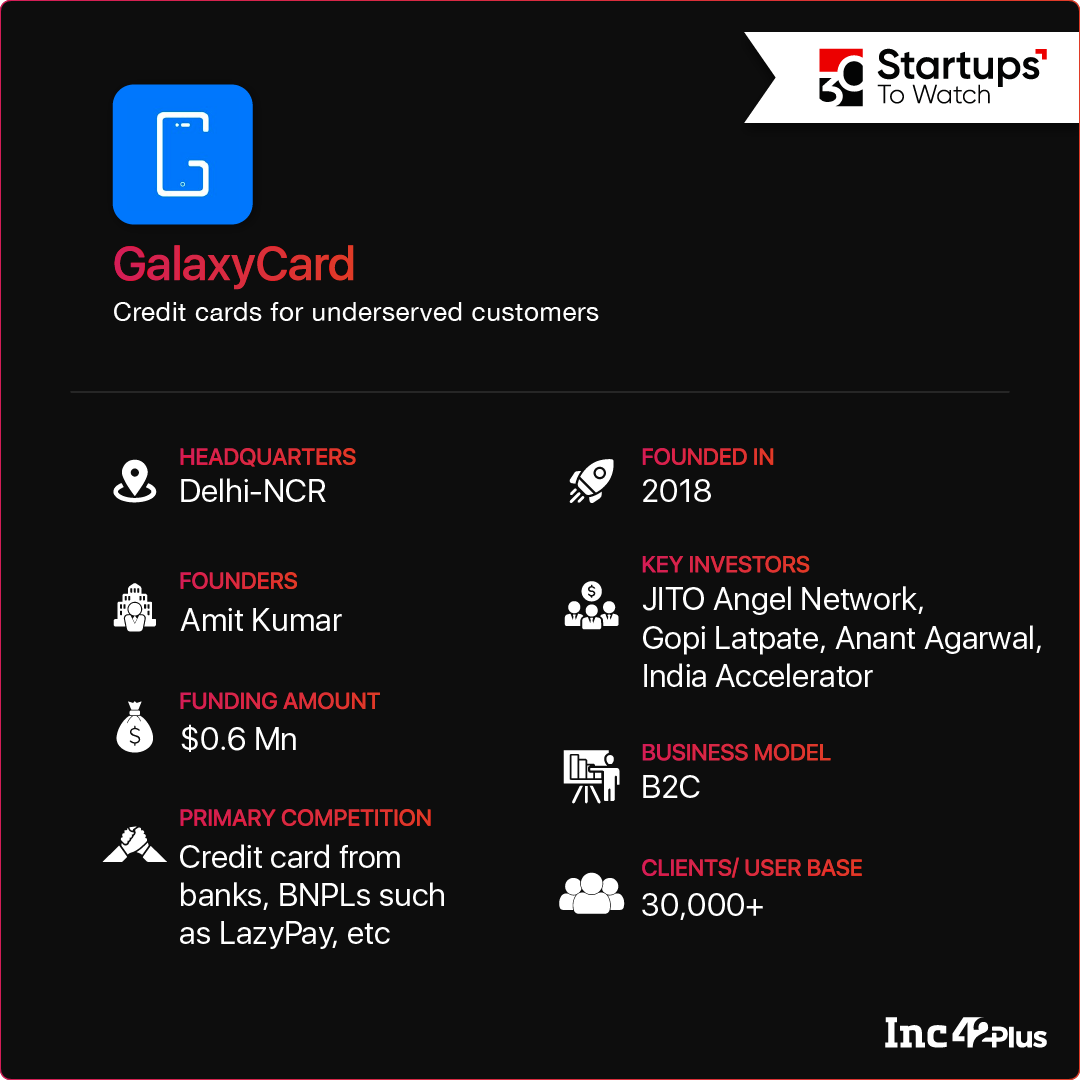
Why GalaxyCard Made It To The List
Amit Kumar, the founder of Gurugram-based GalaxyCard, often came across cab drivers and home helps in need of paltry sums, which they had to borrow from friends and family, employers or the grey market for loans as they had no access to formal credit. Without a credit score, these blue-collar workers are not eligible for credit cards, while their requirements are usually too small for bank loans. After pondering over their plight, Kumar launched GalaxyCard in 2018, offering working credit cards to people who are creditworthy but cannot raise money from banks or other financial institutions due to their locations, low incomes or inadequate credit history.
GalaxyCard’s target customer base includes creditworthy people from Tier 2, 3 and 4 locations who earn less than INR 30,000 a month and may not have a stable income. The startup provides them access to zero-interest credit when cash flow issues hit, setting them free from the clutches of traditional moneylenders. It earns revenue from every transaction (merchant discount rate), interest on EMIs and late payments, and fees on value-added services such as auto-debits.
The company has recently introduced a virtual card that can be used to shop online. It is also planning to scale up its current user base (30K) by 4x in the next two months and by 10x by the end of this financial year. In the long term, it aims to expand globally and introduce add-on and student credit cards.
Glamplus
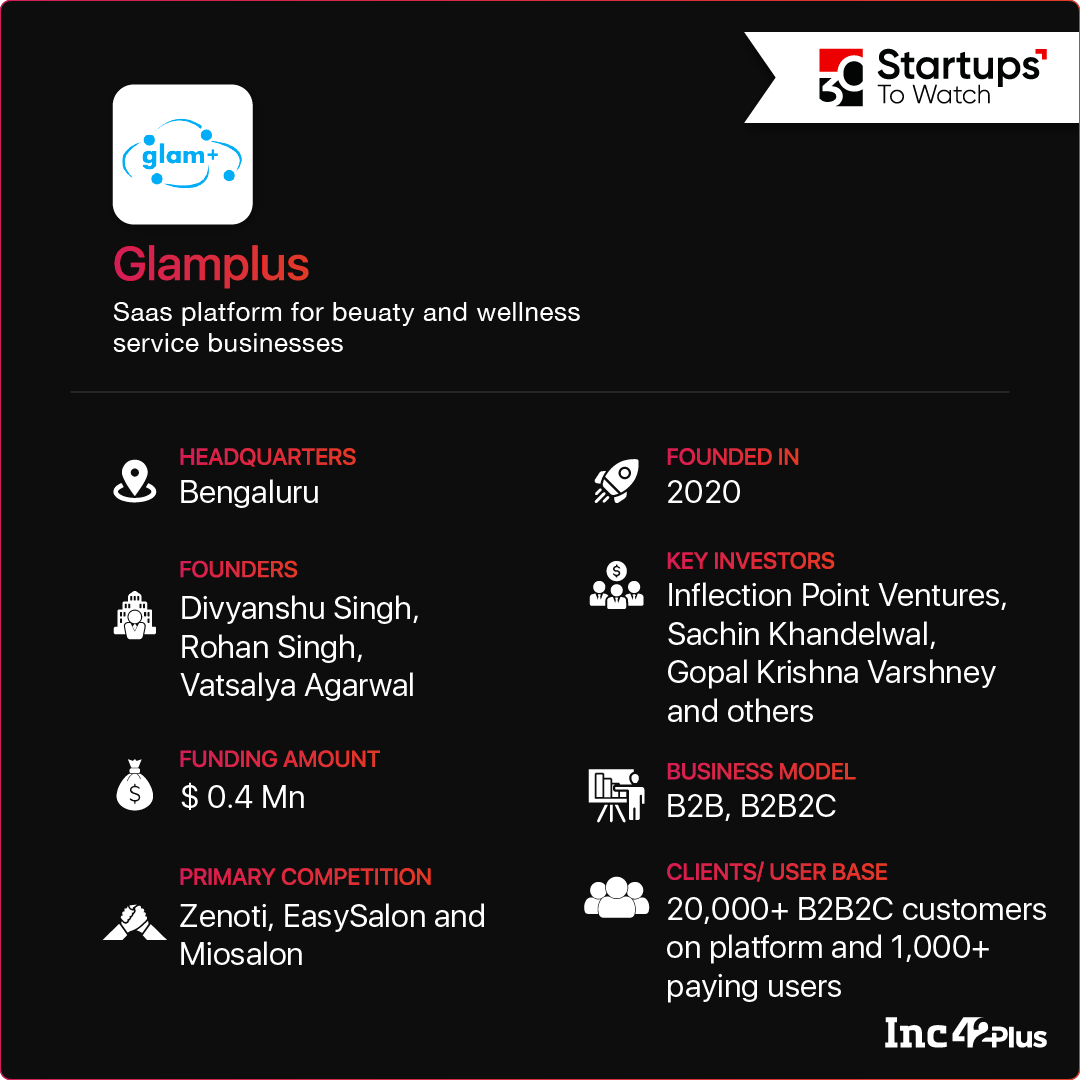
Why Glamplus Made It To The List
Despite their massive presence across the country, gyms, salons and spas, together as an industry, could not digitise their operations to a great extent. To begin with, the nature of these businesses primarily requires in-person service offerings. Virtually meeting one’s gym trainer or salon consultant is not likely to resolve all fitness, wellness or beauty issues, even though experts’ advice (conveyed remotely) may help in some ways. Second, many of these are one-person businesses (sole proprietorship), and the cost of taking all major operations online can be prohibitive.
Set up in 2020, Bengaluru-based Glamplus wanted to address this pain point with a ready-to-use SaaS platform in the beauty and wellness space so that these businesses could tap into their smartphone-savvy customer base with an easy-to-use customer management solution. The startup’s vision: Moving this $200 Bn, SMB-dominated offline economy to a data-driven engagement platform. Its target market: The Asia-Pacific countries, especially India and Southeast Asia.
The company’s bouquet of software solutions include virtual session management, customer management, performance analytics and expense and inventory management, among others. It claims to have more than 20K B2B2C customers on its platform; of them, 1,000+ are paying users from the B2B space. Glamplus says it is growing 3x month on month due to the rise in the number of customers and revenue growth.
Intervue.io
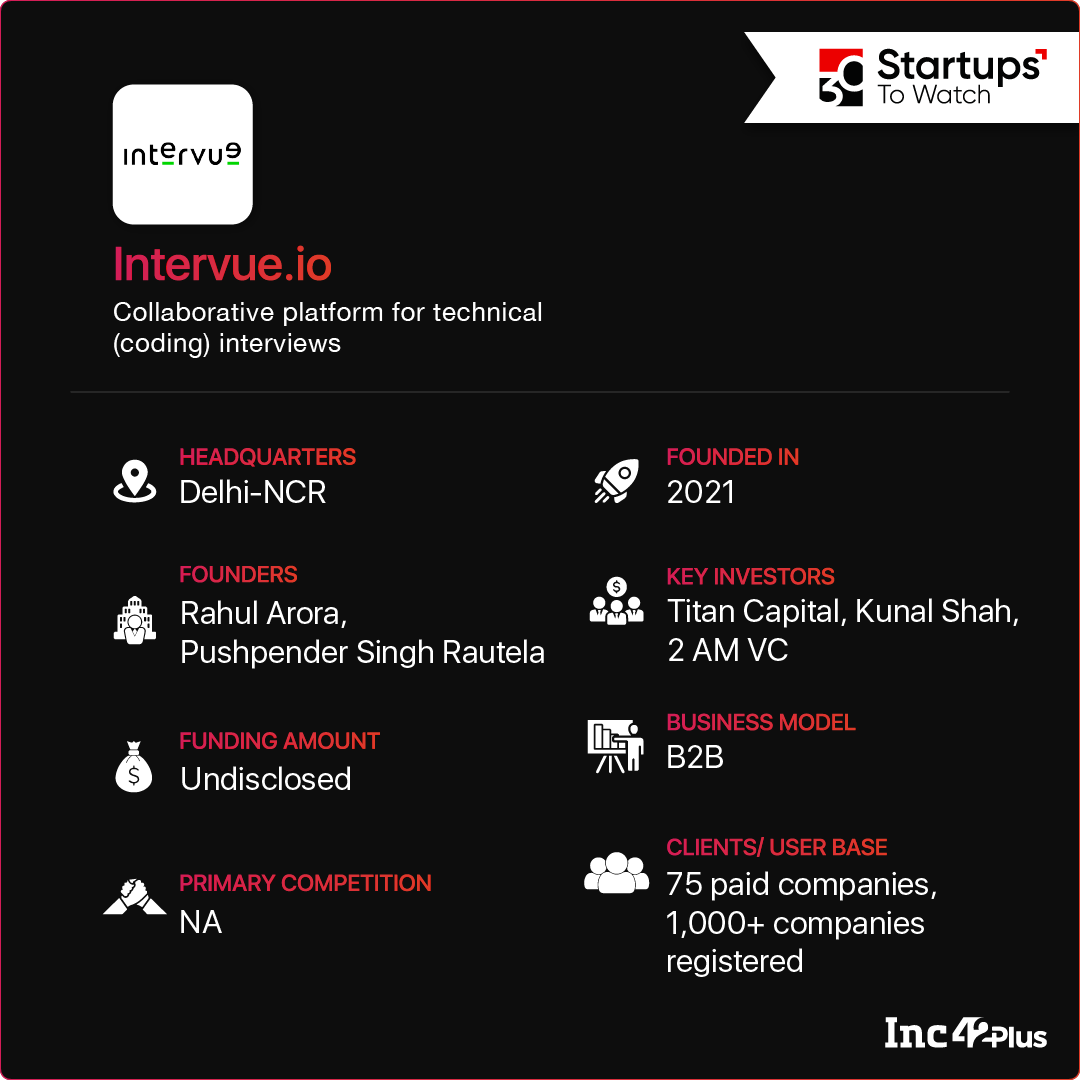
Why Intervue.io Made It To The List
In every tech interview, the first 10 minutes are usually wasted setting up a tech interface to evaluate a developer’s coding skills. And things may get twice as complex during remote interviews. More often than not, these interview rounds are not well-structured, with candidate input and company feedback scattered across multiple screens, documents and email messages. All these can lead to delayed decision-making and poor candidate experience, ultimately hurting a company’s professional image.
After spending more than three years in this space and conducting 500+ technical interviews, Rahul Arora and Pushpender Singh Rautela realised these pain points and came out with a comprehensive SaaS solution earlier this year.
Delhi-based Intervue compresses a one-hour round into five to seven minutes of playback to provide a holistic view of a candidate’s journey on its interview SaaS platform. The subscription-based service is useful for any company hiring for technical roles.
The startup has recently onboarded B2B clients such as InVideo, Betterplace and Karza Technologies that are using the solution for effective interviewing and streamlining tech recruitments. Its immediate goal is to make the platform accessible to all companies irrespective of their size and integrate the platform with other SaaS applications that also evaluate candidates.
Kazam EV
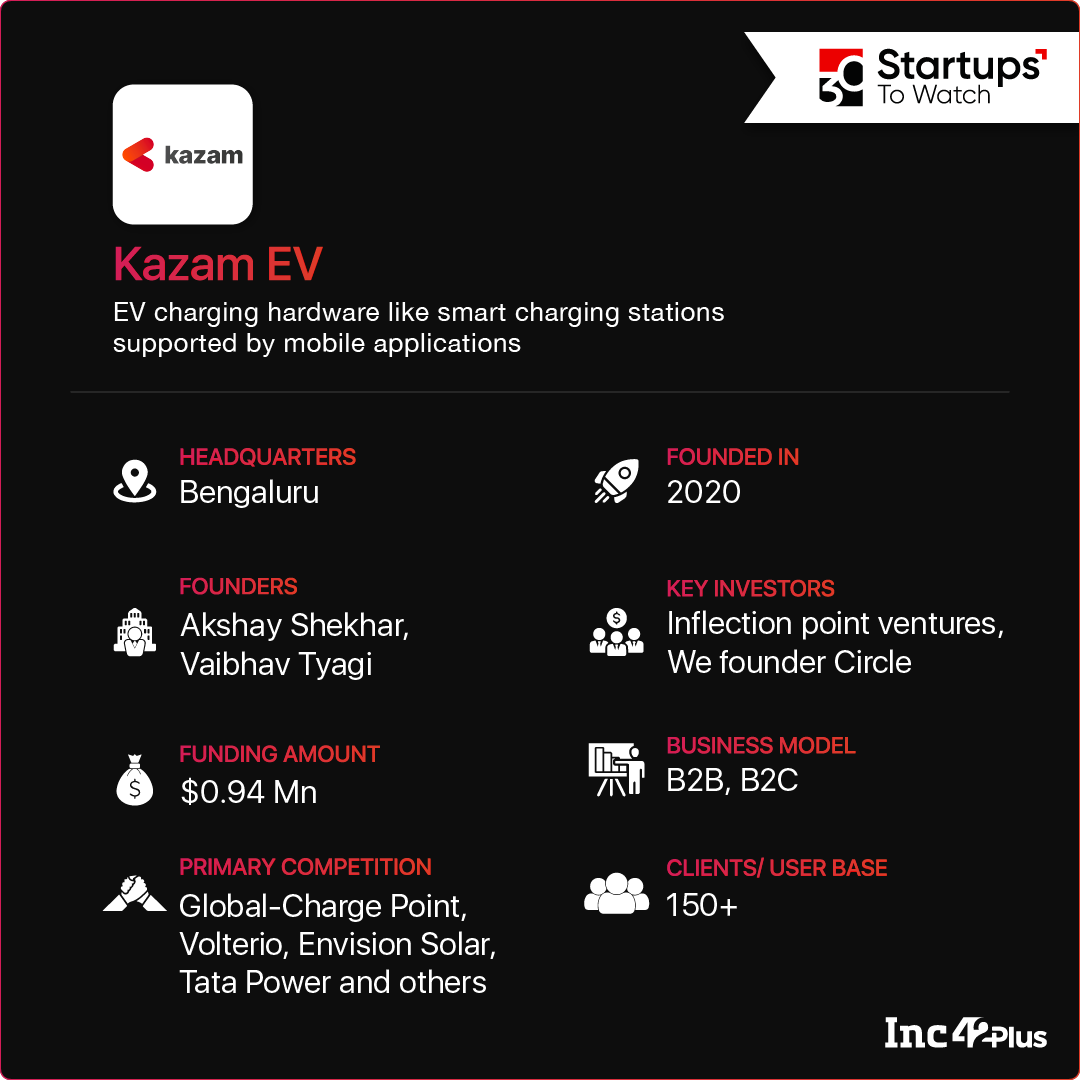
Why Kazam EV Made It To The List
As electric vehicles (EVs) are finally gaining traction in India, most companies are looking to simplify the charging process to make these vehicles more user-friendly. Bengaluru-based Kazam is building affordable and smart charging infrastructure for Indian consumers in tune with the new-age need for eco-friendly mobility.
Set up in 2020, the startup has built its IoT-driven hardware and supporting software stack that also works for other charging infra manufacturers, thanks to Kazam’s open architecture protocols and charge management software (CMS). The procedure is simple. Every charging hardware is sold with a software solution to enable easy access to its SaaS platform so that drivers can search and navigate to the nearest station. The company also helps micro-entrepreneurs (like kirana and mom-and-pop stores) set up charging infrastructure on their parking spots for earning money. Kazam products are used by EV OEMs, EV fleet operators and micro-entrepreneurs looking for additional incomes through EV charging services.
With a presence in seven Indian states, the startup claims to have sold 200+ Kazam 3.3 charging points in five months. It aims to instal 10,000 EV charging stations by FY22 and build the largest charging station network in the country.
Knackit
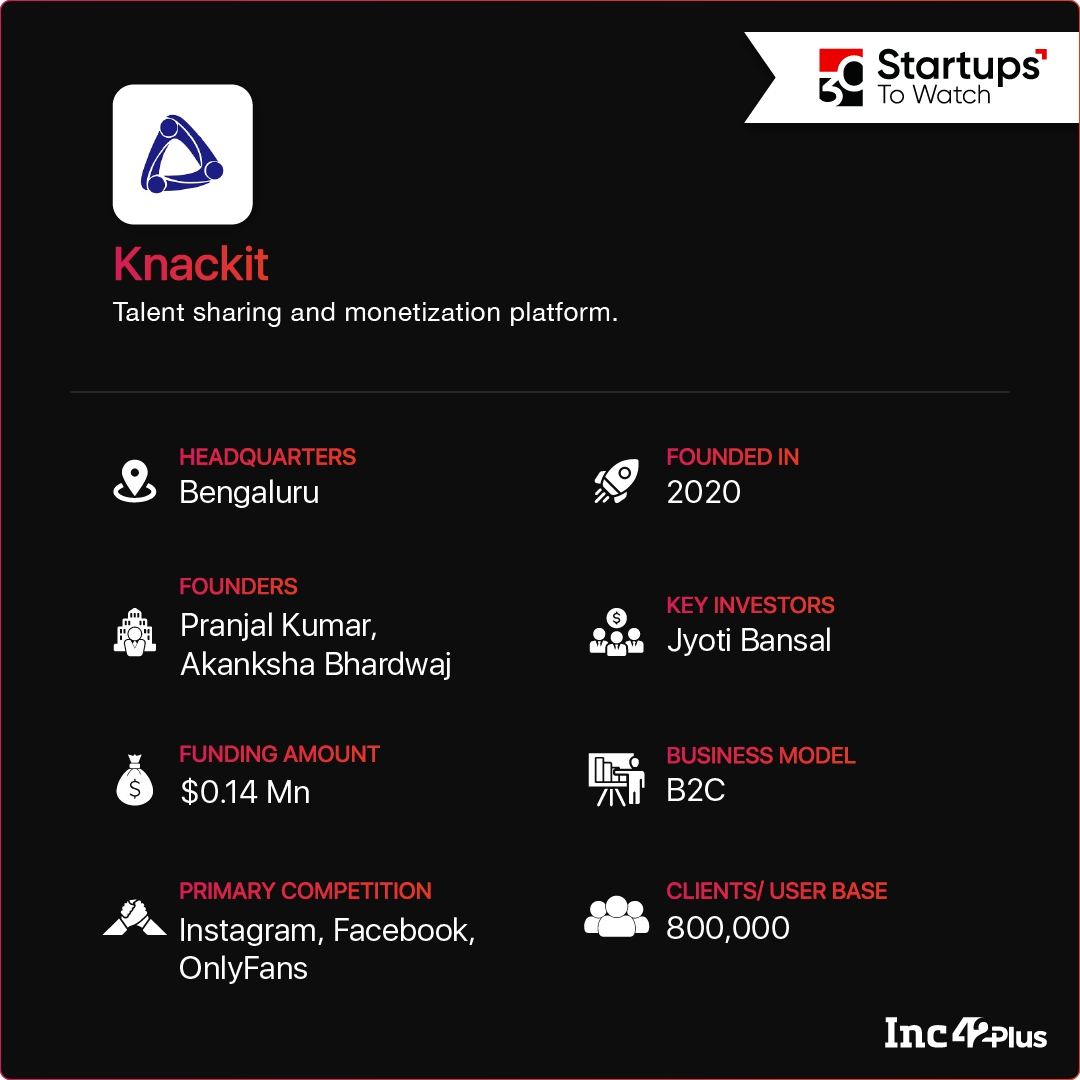
Why Knackit Made It To The List
While LinkedIn is used by technology, management and other professionals to stay connected with their respective industry segments, artistes have to depend on informal social media engagements for similar discovery and professional networking. To ensure a better networking experience across the performing arts landscape, Launched in 2020, Bengaluru-based Knackit has developed a talent discovery solution that can lead to hassle-free paid work.
Artistes on Knackit (the platform calls them creators) share relevant content and participate in various contests related to their skills. The platform helps them earn through regular content creation, which would have typically depended on ad revenues from social media platforms and creators’ platforms like YouTube. Besides, the startup creates healthy competition among peers and lets creators improve their skill sets. Its revenue comes from non-refundable fees required to enter contests, commissions on tips to creators and charges for app usage.
Knackit is currently improving the existing features on the platform. It is also targeting 2 Mn users by September this year, from 800,000 at present. In the long term, it wants to become the go-to platform for creators for any kind of talent monetisation. The company is also exploring edtech blended with VR for skilling.
MedPay
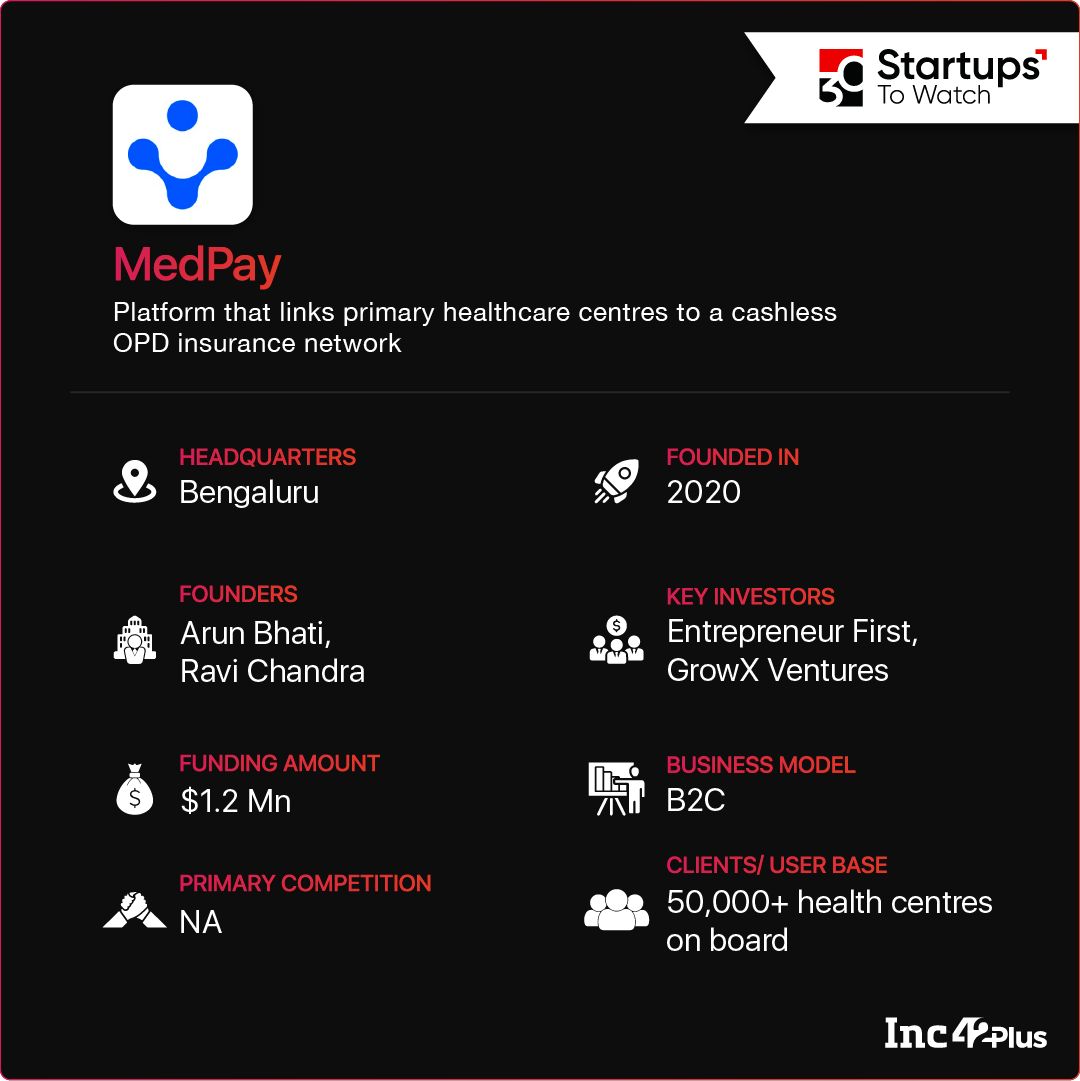 Why Medpay Made It To The List
Why Medpay Made It To The List
Patients suffering from acute health problems often require daycare/OPD treatment instead of full-fledged hospitalisation or in-patient care. But as seen during the Covid-19 pandemic, even OPD expenses can be quite high, given the cost of treatment and medication. And the other alternative, treatment at home in the absence of institutional facilities (home ICUs are quite common nowadays), may cost as much as regular hospital care, if not more.
In all such cases, quick and efficient disbursement of health insurance holds the key to instant cost coverage and better patient care. But the implementation speed in the traditional health insurance space leaves much to be desired. Again, a few companies have introduced OPD cover and other health insurance products to meet home treatment expenses. However, this is still a nascent segment and does not solve the disbursement issue in a hurry. Set up in 2020, Bengaluru-based MedPay realised these pain points and developed a tech-enabled B2B platform for seamless connectivity between healthcare and insurance facilities to benefit patients at the earliest.
MedPay has built an API infrastructure that connects healthcare service providers – standalone clinics, pharmacies and labs – to insurance companies through its MedPay Connected Care Network (CCN). The company’s API integration and CCN allow primary healthcare centres, diagnostic labs and pharmacies to connect with the cashless insurance network for optimum patient benefit. Simply put, if a person has an OPD cover linked to CCN, he/she can avail of cashless services from all healthcare centres on the CCN platform.
Incidentally, a wide range of institutional players can use MedPay CCN’s API-as-a-Service to extend their services and grow their businesses. For instance, health insurers providing cashless OPD cover can tie up with corporate houses, and e-pharmacies can find suitable partners for hyperlocal care delivery.
Currently, MedPay CCN has access to 50K+ health centres, spread across 450 cities and covering 4,000+ pin codes. It has also processed OPD payments worth INR 14 Cr+ in one year, the company claims. Going ahead, the startup wants to build India’s largest primary healthcare network.
OneCode
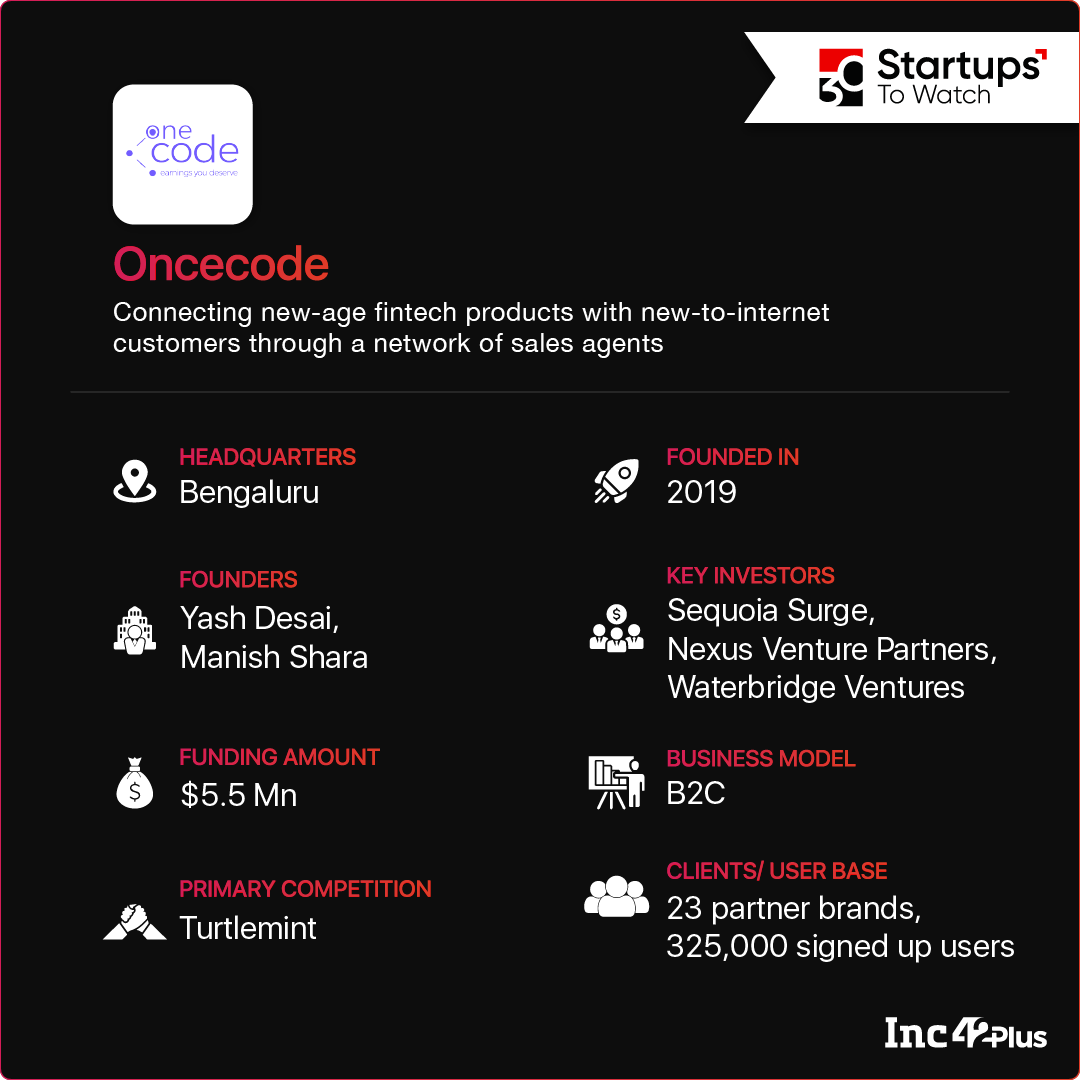
Why OneCode Made It To The List
Although the Indian government is doing its bit to improve and incentivise the digital payments ecosystem, fintech startups across the country have matured fast and made available a wide range of financial products with a few taps or clicks. But there is a glitch. Most of these products have failed to gain traction beyond top cities as millions of first-time internet users are still wary of fintech products bought and sold online. Bengaluru-based OneCode was aware of this trust issue and the problems faced by people new to the fast-growing digital ecosystem. So, it decided to partner with thousands of ‘agents’ from small towns (resembling the friendly and familiar neighbourhood advisors helping people with investments, insurances and more) to generate trust among not-so-savvy fintech customers.
Set up in 2019, OneCode works in the BFSI space and connects new-age, digital-first fintech brands with ‘relevant’ sellers who can overcome the trust issue through assisted sales and support. The startup’s target ‘sellers’ are people in commission-based sales roles from Tier 2 and Tier 3 markets, ready to bring in new fintech users. Finding the right kind of people should not be difficult, though, as India is home to an estimated 50 Mn sales agents.
OneCode gets part of an agent’s commission when he/she brings business to a partner brand. To date, it claims to have onboarded 23 fintech brands and 3.25 Lakh agents via its app.
Pankhuri
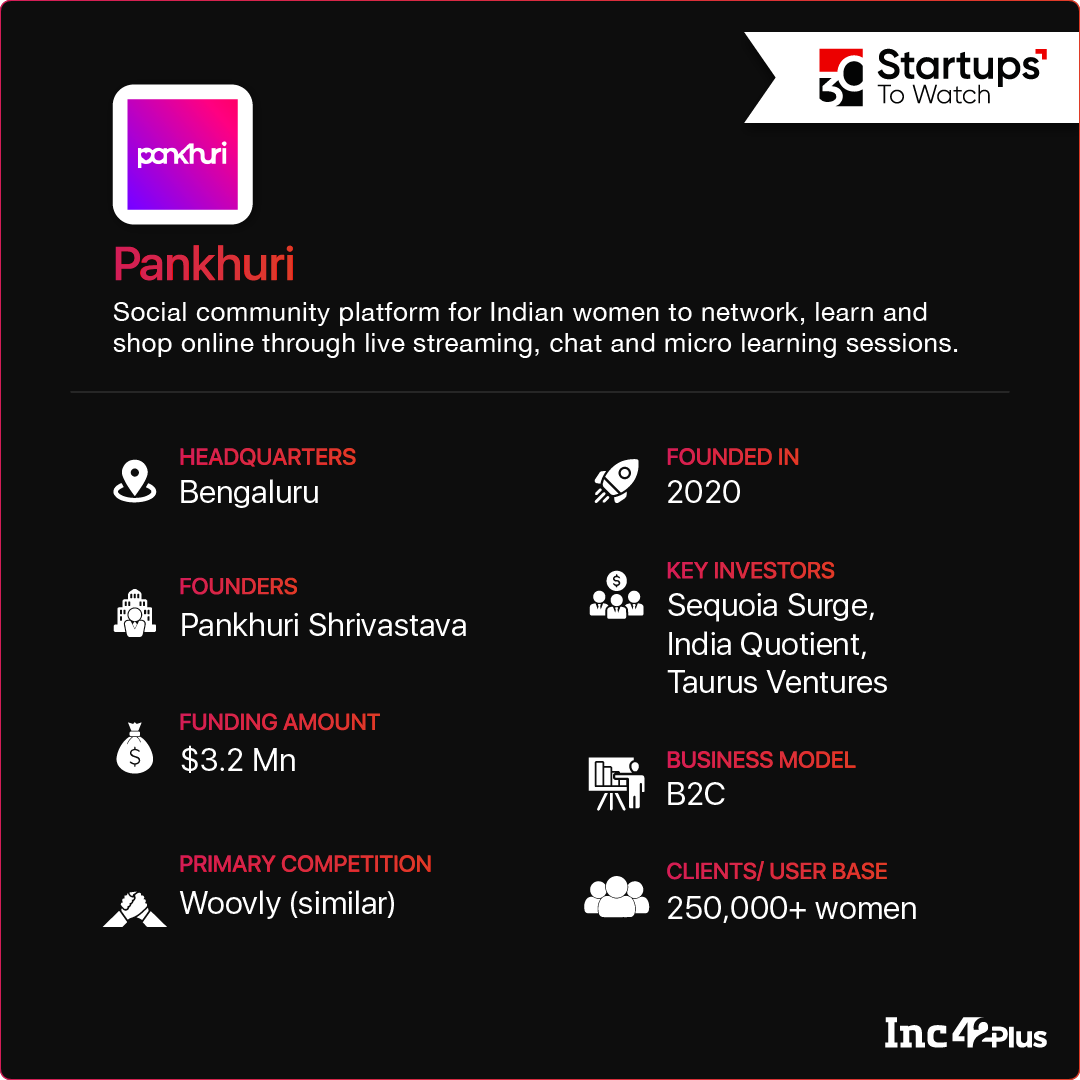
Why Pankhuri Made It To The List
India is home to an estimated 240 Mn digitally savvy women, but only 27% of them are currently present on popular social media platforms. Many shy away from engaging online due to a lack of confidence or security reasons as online harassment (often leading to offline threats) has become too common nowadays. Launched in 2020, Bengaluru-based Pankhuri is addressing this concern with a social community platform for women in India so that they can network, learn new things and shop online through live streaming, chat and micro sessions.
This women-only social platform has a particular focus, though. Within a short span, it has emerged as a social network for beauty enthusiasts who want to engage with a purpose and share knowledge without the fear of trolling. As a result, the online community lays the utmost stress on moderation and respectful participation.
Pankhuri claims that its engaged community has more than 2.5 Lakh women, tuning in from all over the country, especially the underheard Tier 2 and Tier 3 locations. The platform also offers a range of fee-based micro-learning sessions for beauty enthusiasts where they learn from content creators and experts. More than 50,000 monthly transactions are seen in this space, the company says. Its immediate goal is to grow the community while it continues to experiment with subscriptions, chatrooms, clubhouses, storytelling by influencers and make-up artists and other exciting features.
Paz Care
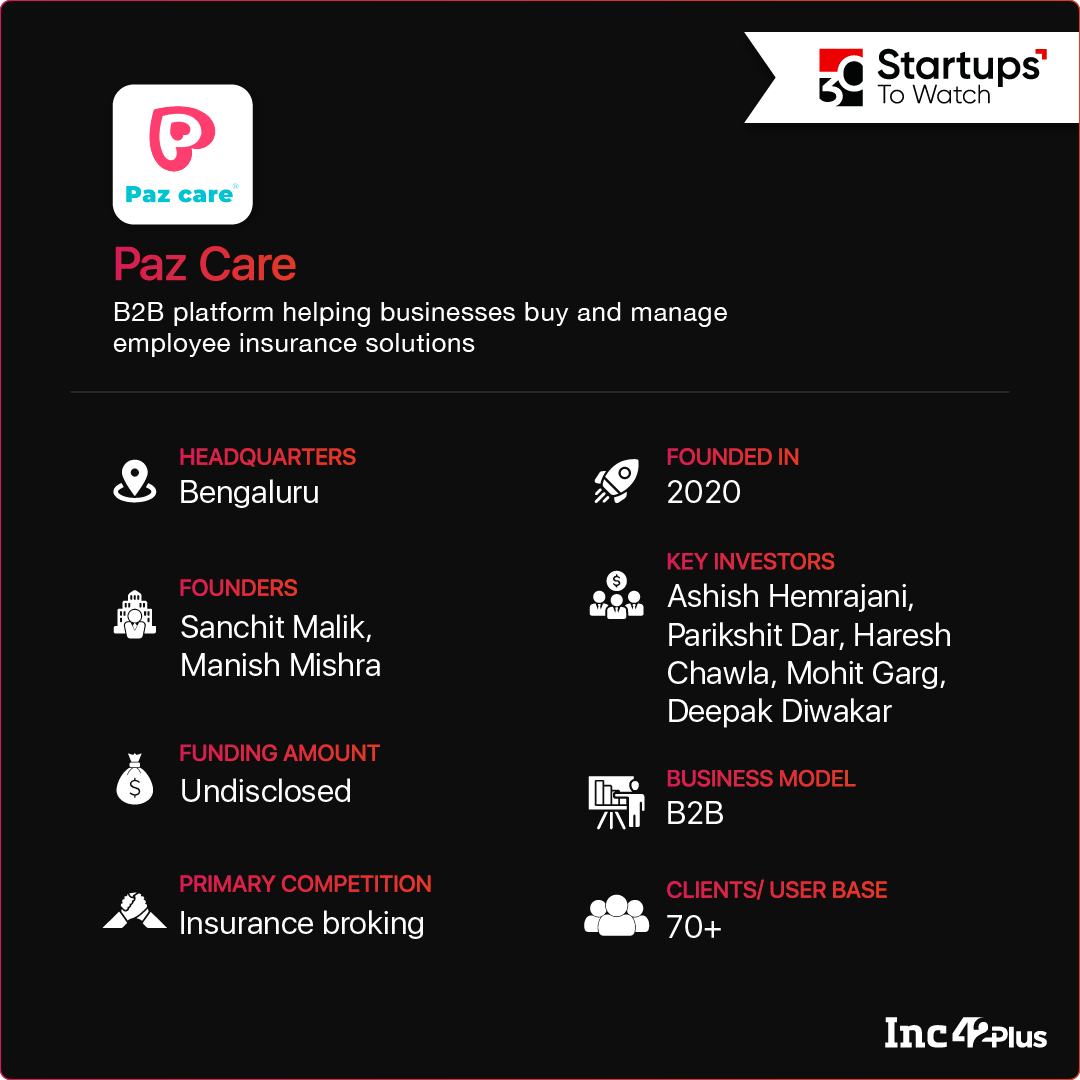
Why Paz Care Made It To The List
As India struggles to recover from the physiological and economic impact of the Covid-19 pandemic, more and more employers are looking for employee health insurance and related benefits to protect their workforce and prevent further setbacks to their business operations. This has created a massive opportunity for insurtech companies focussing on employees’ health benefits. Bengaluru-based Paz Care is one such company that aims to service 10,000+ employers and get as many as 3 Mn people insured in the next three years.
Founded in 2020, Paz Care follows a standard marketplace model, onboarding health insurers and businesses on its SaaS platform. It has already brought in 70+ companies, including Mamaearth, Appknox, Goodera and BookMyShow (BMS founders are investors in tech startups), among others.
In the long term, the startup wants to launch its services overseas and provide holistic solutions for employee healthcare to safeguard resources.
Peakperformer
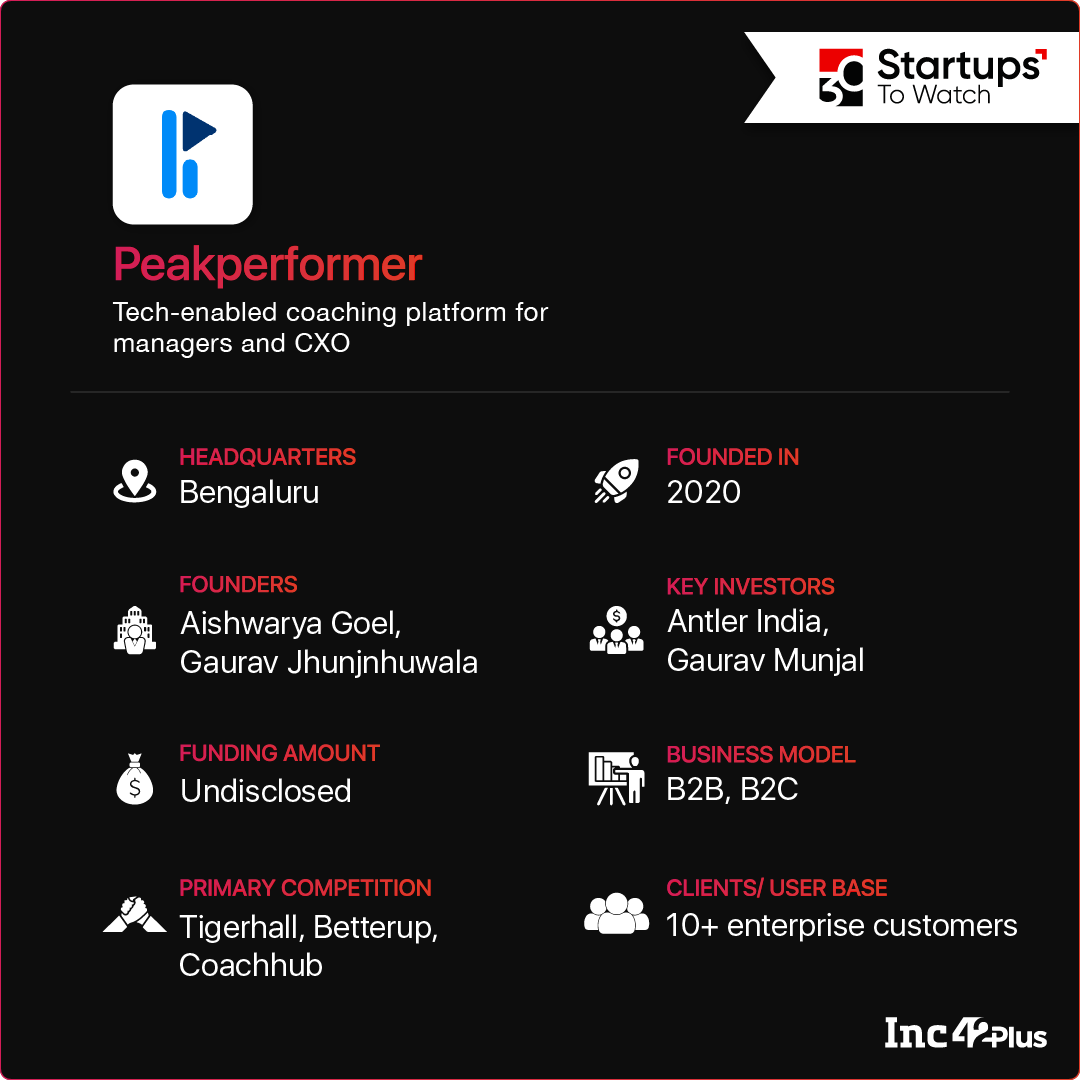
Why Peakperformer Made It To The List
Professional skilling, reskilling and upskilling are now considered an integral part of business growth strategy in India as traditional job roles are changing fast in the post-pandemic era. In fact, a big chunk of the $1.96 Bn edtech industry has been set up to help professionals upgrade their skills for better jobs and paycheques.
However, most of these solutions, both in-house and external, have been developed, keeping in mind specific technical requirements. On the other hand, few companies have curricula that focus on building management skills for leadership roles. There are 90 Mn+ managers globally, but only a handful of potential and sitting CXOs get professional coaching for their critical roles and responsibilities.
When faced with leadership challenges in their respective organisations a couple of years ago, the future founders of Peakperformer saw an opportunity in this space and set up the company in 2020.
Bengaluru-based Peakperformer is a tech-enabled coaching platform for managers and offers scalable, high impact leadership development solutions at all levels. It connects learners with industry experts who provide customised coaching digitally. The company has an annual subscription model and three subscription brackets starting from $99 a month (payable yearly). Depending on organisational and employee-level goals, a company can buy a licence for every manager undergoing the training, and the fee will be based on the person’s experience level. Peakperformer has enterprise clients like Bizongo, Urban Ladder, Wingify, Société Générale, CRED and MPL, which have opted for its coaching services.
Currently, the startup is strengthening its leadership team. It is also planning to develop a robust AI-driven coaching platform and emerge as a market leader in this space.
peAR Technologies
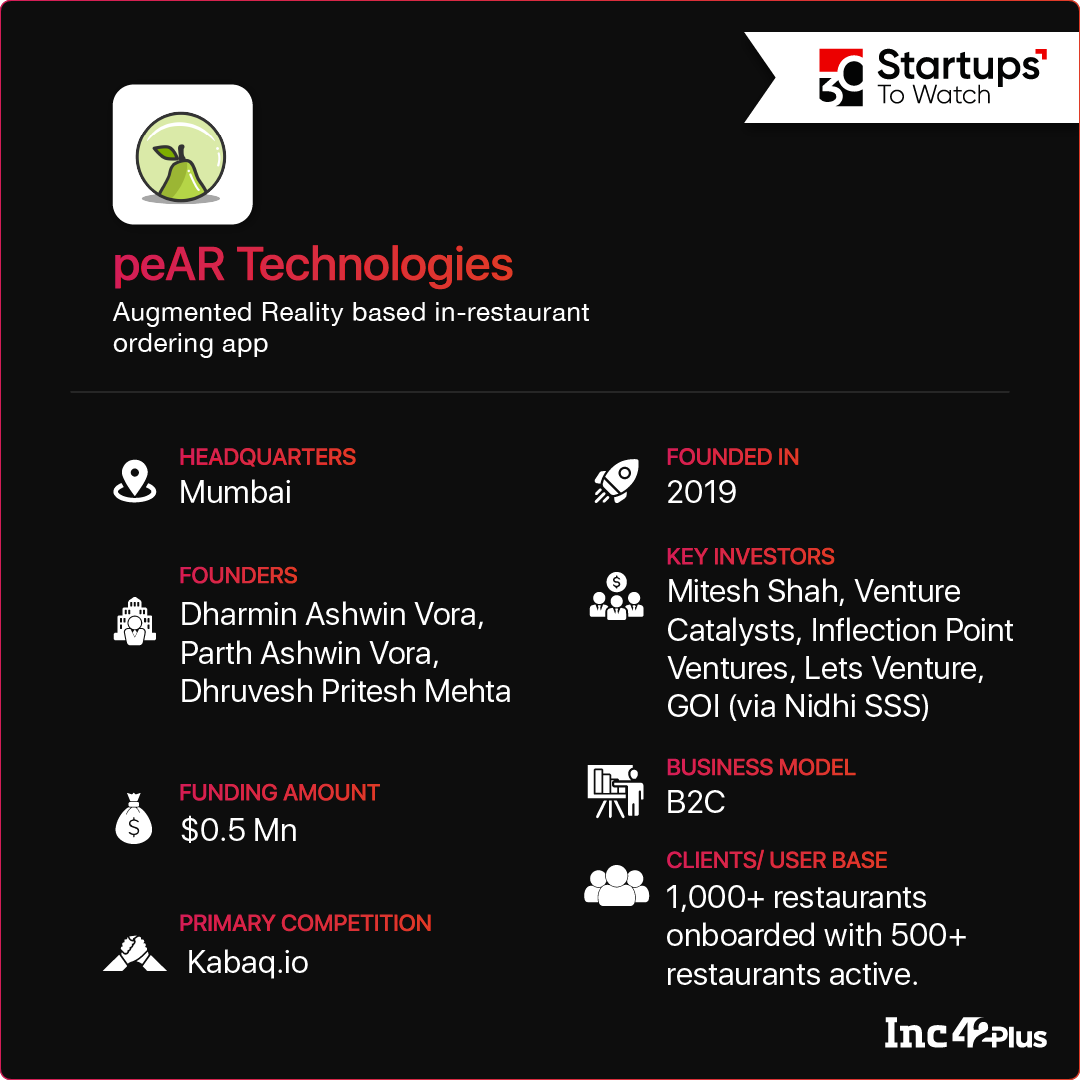
Why peAR Technologies Made It To The List
Imagine restaurants doing a roaring business again (it will happen eventually), people meeting friends for dining out and then having trouble deciding the menu at a new establishment. The waiter suggests using an app to see how the food will look to help diners make up their mind. The app is duly downloaded, and patrons have a fair idea of the restaurant’s Miso Ramen or Korean Japchae — the portion size, colour, key ingredients and more — to decide if it goes with their mood and appetite. The rest of the evening should be a happy gourmet exploration instead of the food disaster every diner experiences now and then. Sounds good? This is precisely what Mumbai-based peAR Technologies is offering.
peAR is augmented reality or AR-based in-restaurant ordering app that enables users to view the entire menu in 3D live on their table before deciding on the fare. As customers make an informed decision via the app, this helps restaurants upsell and earn 20% more revenue, the startup claims. It also charges a 5% commission on each order reviewed and processed on the AR app. But here is a surprise. As restaurants (and the entire hospitality industry) took the worst hit during the Covid-19 pandemic, peAR has waived restaurant commissions for the next six months. Besides, for every 100 orders processed by the app, the company donates one meal to an underprivileged family.
Launched in 2019, the startup claims to have grown 50x, from 100 orders in September 2020 to 5,000 orders per month, placed through the AR app in March 2021. It has also onboarded 1,000+ restaurants in Mumbai, of which 500+ restaurants are active. The traction is bound to increase as peAR will be expanding to Delhi, Pune and Bengaluru in August, September and November, respectively. It is also developing proprietary technology and algorithms to build AR 3D models at scale.
Pocketly
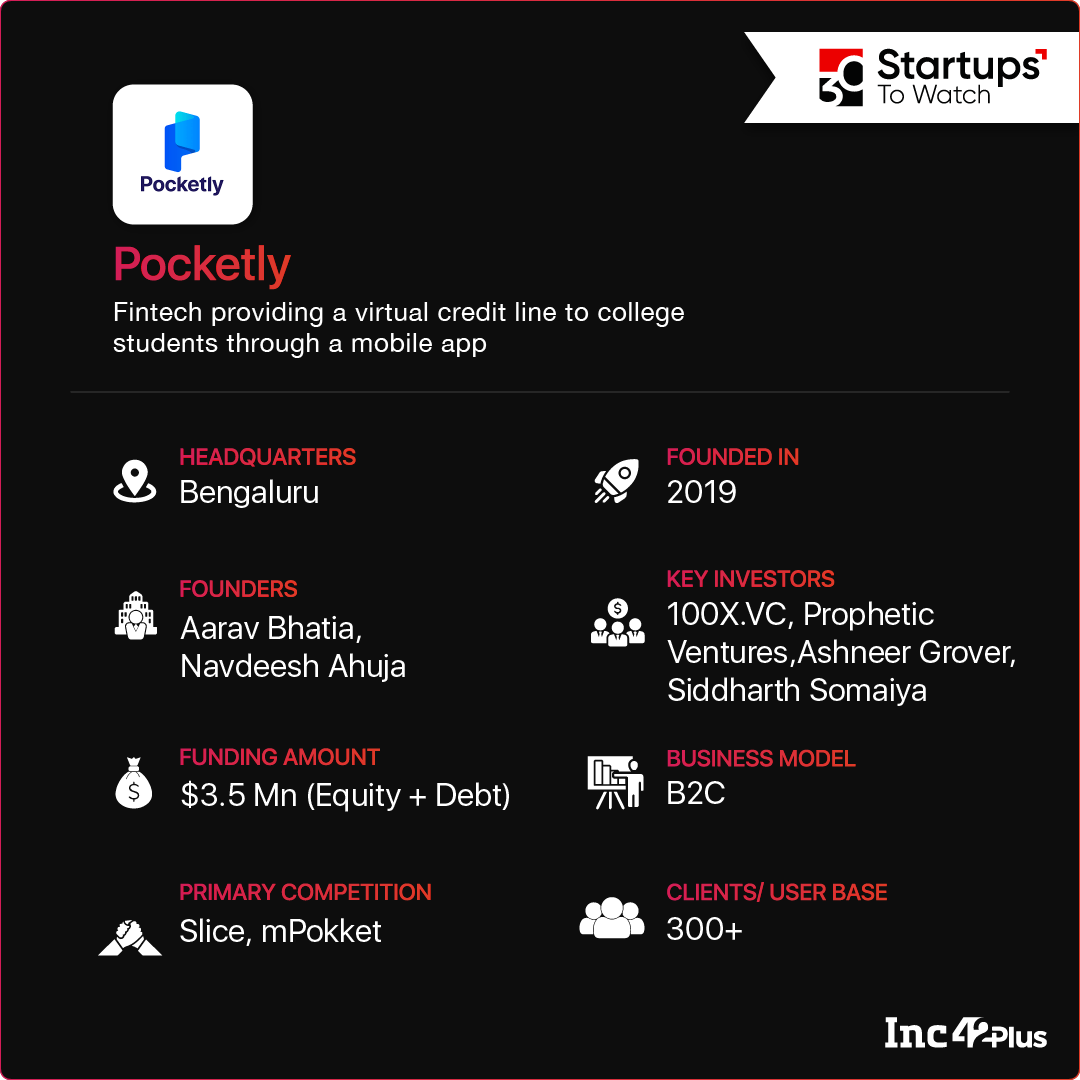 Why Pocketly Made It To The List
Why Pocketly Made It To The List
Fintech companies and neobanks are increasingly looking to provide credit and micro-lending solutions to students and tap into a market crowded by internet-savvy young users. However, most financial institutions demand a good credit score for such loans, and in many cases, the minimum loan amount is higher than a student’s requirement. Bengaluru-based Pocketly’s solutions target this segment and help students build strong credit profiles before entering the professional world.
Launched in 2019, Pocketly is a fintech firm offering a credit line to college-goers via its mobile app. And it charges interest on every loan extended through its credit line over and above the usual interest charged by lenders.
The startup has recently crossed INR 100 Cr in gross transaction value and currently services more than 300,000 customers. It is looking to grow 10x in loan volume in the next 12 months and serve 1 Mn+ college students. Its long-term vision is to become a non-banking financial company (NBFC) with the focus on digital lending and multiple lending products.
Portl
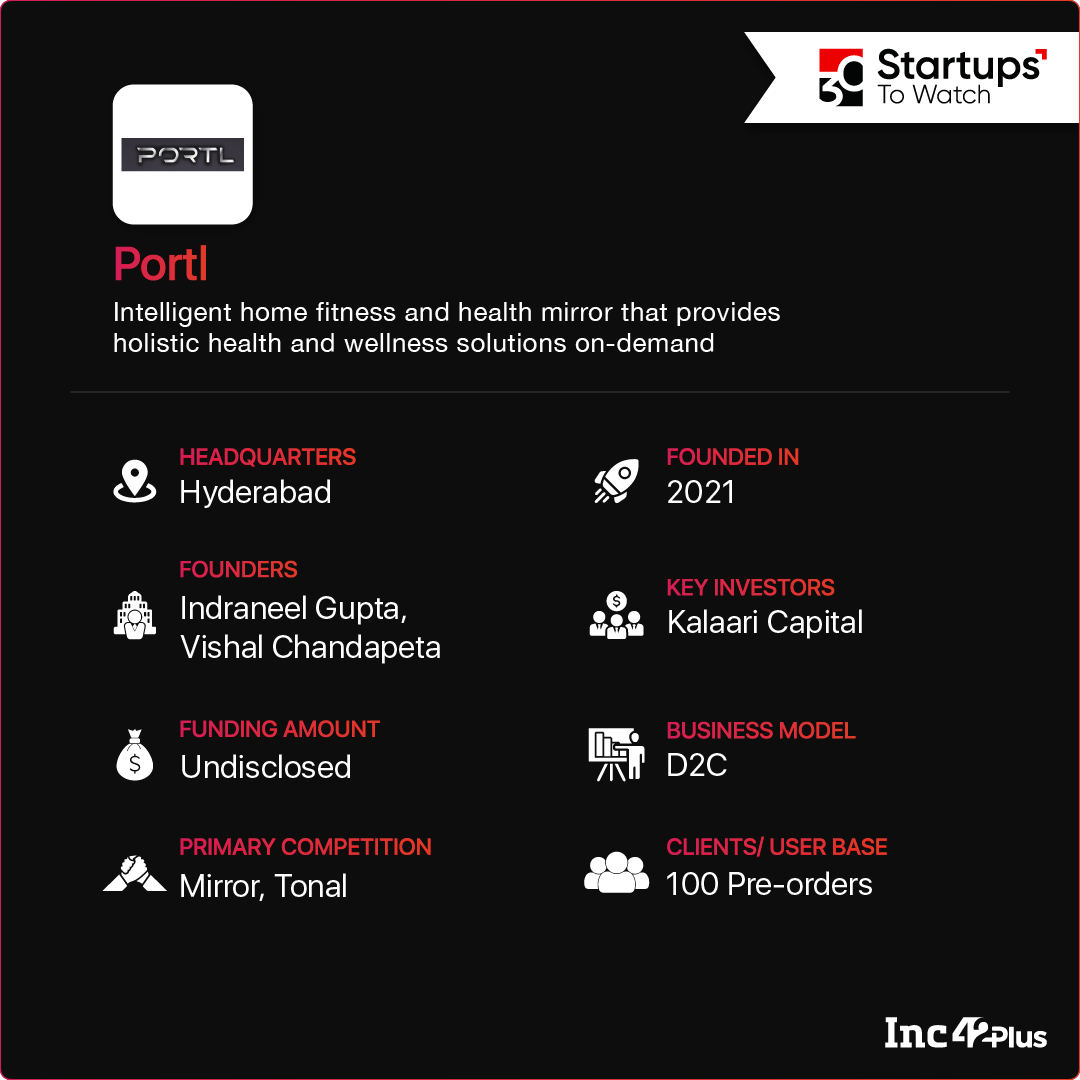
Why Portl Made It To The List
This startup might have materialised straight out of a sci-fi show like the Black Mirror. Imagine having a mirror at home that can look at people and diagnose their fitness levels without walking miles or sweating it out at the gym or jogging or swimming. One’s simple but effective home exercise regime is quite enough for Hyderabad-based Portl to analyse if things are done right or not. The startup offers an intelligent fitness and health tracker that can be used indoors. Home workouts and their outcomes often turn out to be inaccurate due to a lack of controlled, meticulous measuring and an efficient feedback mechanism. In contrast, Portl uses a proprietary, AI-driven ‘smart mirror’ technology to offer immersive, on-demand and live fitness class experience with the help of world-class instructors. It also provides real-time posture analysis and form correction.
The D2C company is now busy fulfilling the 100 pre-orders it has received for the ‘mirror’. But it is also building the hardware as a ubiquitous device for comprehensive monitoring of health and fitness. Portl says its hardware can be later paired up with other health and wellness-related software applications to ensure a holistic approach.
RockClimber
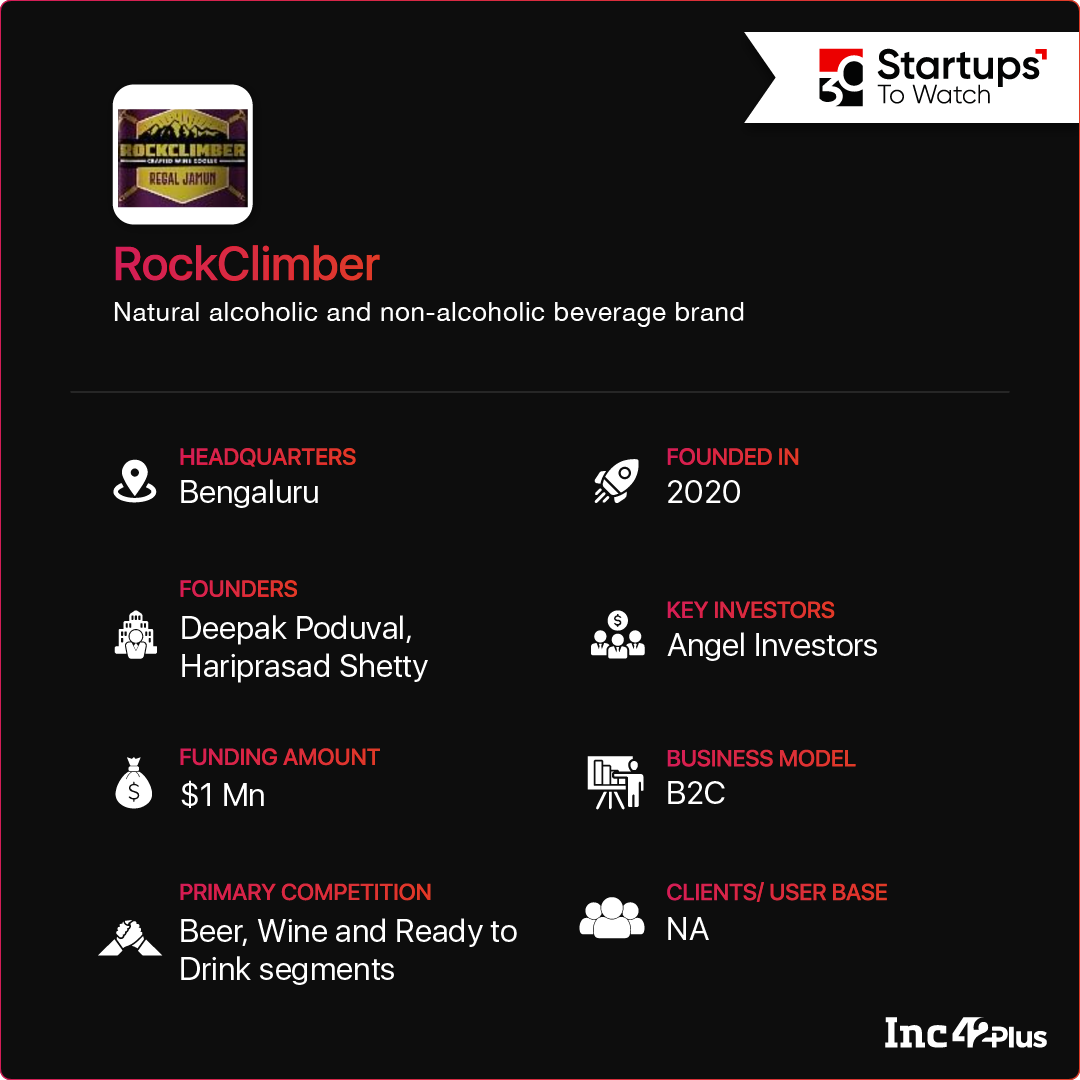
Why RockClimber Made It To The List
Many people enjoy drinking wine. But the rituals of cooling it right, pairing it with the right food and mastering the set of etiquettes give it an air of social snobbery and make people uncomfortable, especially in a formal setting. However, Bengaluru-based RockClimber wants to change this perception and make wine available in user-friendly formats that can be enjoyed in a carefree way, just like drinking beer.
Launched in 2020, this alcobev brand (it also offers non-alcoholic drinks) has a powerhouse portfolio of crafted wine coolers, mixers and other wine collections made by a team of Indian and international winemakers and beverage scientists. Crafted wine coolers are a relatively new category, a low-alcohol mix of wine, beer and carbonated beverage. The chilled new drink aims to break away from the traditional clutter of high-alcohol drinks and uses wine as the base. The startup has done R&D for more than three years to create a portfolio of products made for the Indian palate.
RockClimber products are currently available in Maharashtra, Goa and Punjab, but the brand aims to expand to 20 states and several Union Territories. In fact, it will enter as many as 10 states by 2021. In the long term, the startup hopes to launch globally.
According to the law of the land, alcoholic beverages cannot be sold online. Hence, these are currently available across retail outlets and hotels/restaurants, although the company hopes to sell online when regulations permit.
SaveIN
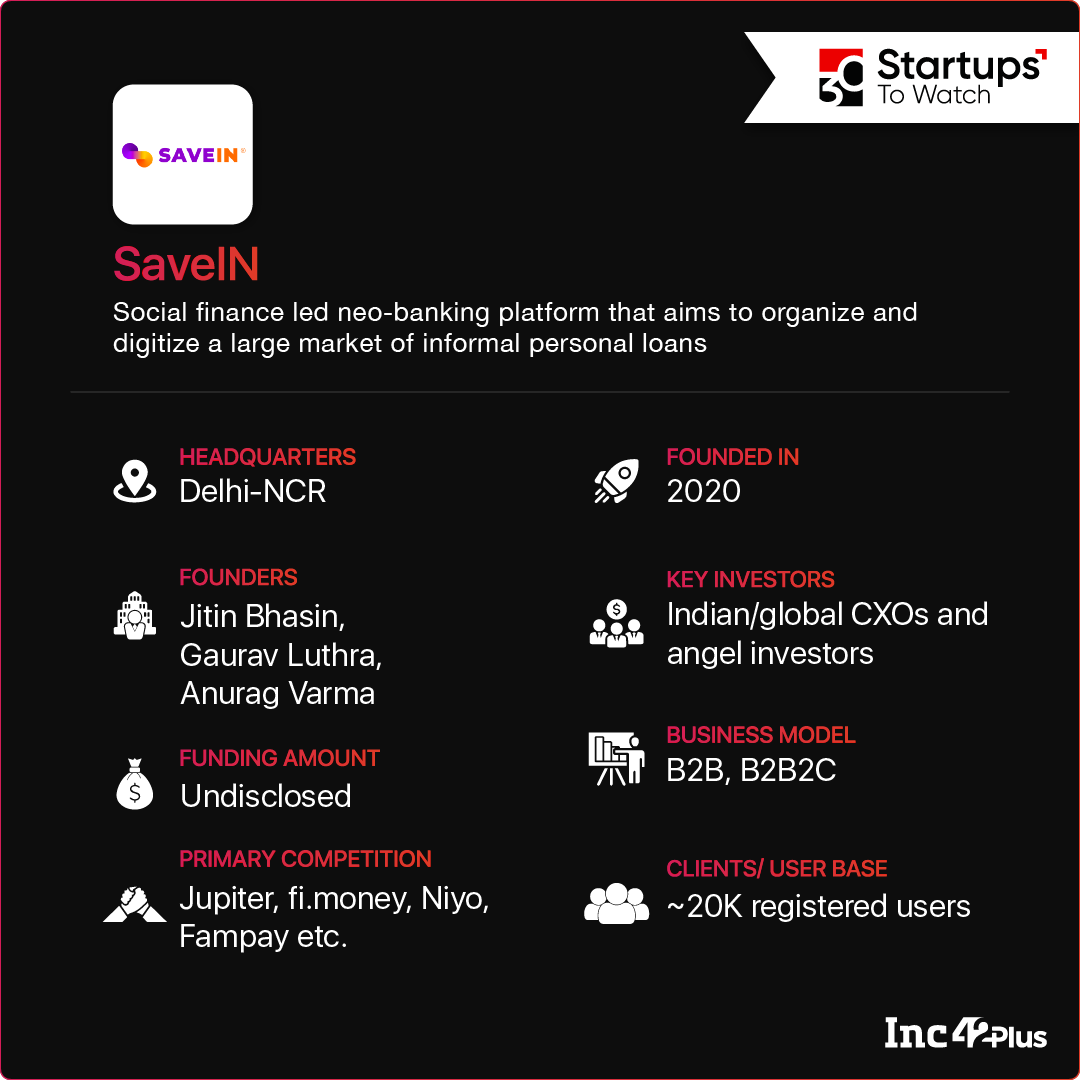
Why SaveIN Made It To The List
Nearly 80% of Indians lack access to formal credit due to inadequate credit history, and hence, lend to or borrow from their social circles. However, this happens to be India’s largest personal loan market that remains unorganised and untapped, lacks transparency and has fractured payment processes. So, Gurugram-based SaveIN wanted to formalise this market with the help of social finance. Interestingly, the startup got a patent from the Indian Patent Office in July this year for its flagship social finance product.
Set up in 2020, SaveIN is India’s first social finance-led neobanking platform that aims to organise and digitise a large market of informal, relationship-based personal loans. Its target customer base includes 200 Mn+ digitally active Indians who have access to smartphones and use digital banking and payments. The company also aims to build commission- and subscription-based revenue streams. People using its social finance product will have to pay subscription fees, while commissions will be charged on transactions and platform usage. It will further earn commissions on cross-selling banking and financial services products such as savings accounts, debit cards, loans, insurance plans and investments.
The startup is currently in beta, and its immediate goals include scaling up the usage of its social finance product and offering a bouquet of neobanking services in partnership with a leading bank. In the long term, the startup will provide a host of personal finance products and services and create an alternative credit profile for each SaveIN user along with a financial health score.
Supertails
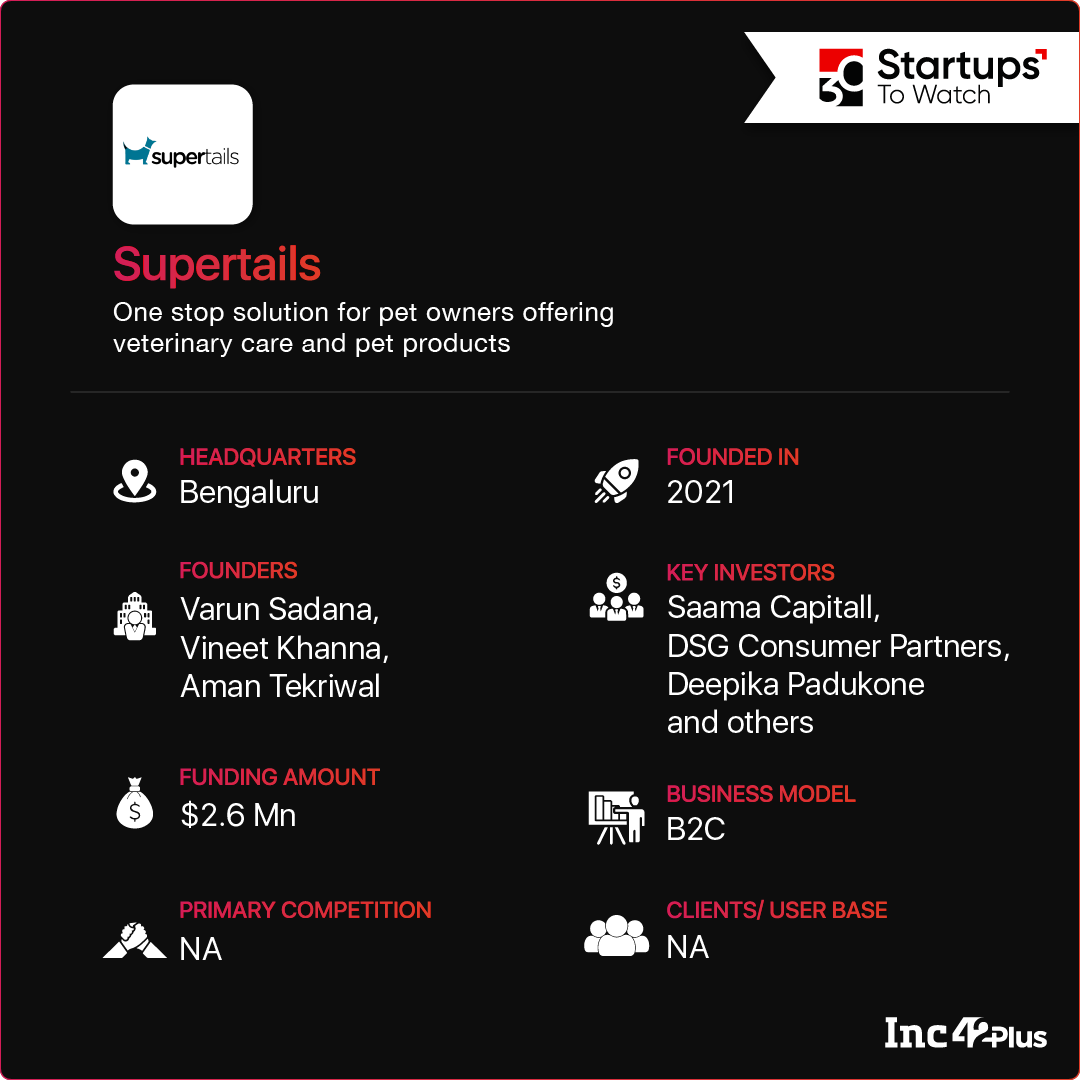
Why Supertails Made It To The List
According to data from the Department of Animal Husbandry, Dairying and Fisheries, the pet care industry in India is poised to grow significantly, similar to what has happened in more evolved pet markets like China ($30 Bn) and the US ($105 Bn) in the past. Currently, more than 12% of urban Indian homes have pets, and there is a care need for more than 2.5 Mn pet dogs and 4.5 Mn pet cats. Knowing how pet lovers care for their animal friends and want to keep them healthy and happy, Bengaluru-based Supertails set up a telehealth platform for pets in May 2021.
Supertails is a first-of-its-kind platform that provides reliable veterinary care and a one-stop facility for pet food and supplies. To begin with, its fully digital telehealth consultation service is attended by a team of experienced in-house veterinarians. The company claims to have witnessed a 90%+ recovery rate within 14 days from the date of the first consultation. Also, with doorstep product delivery available across the country, the brand aims to bring pet parents the most extensive assortment of pet supplies from India and abroad.
The startup is currently developing its marketing strategy to create better awareness about its offerings. It will soon launch digitally enabled behaviour training for dogs so that pet owners can easily benefit from this.
The Sleep Company
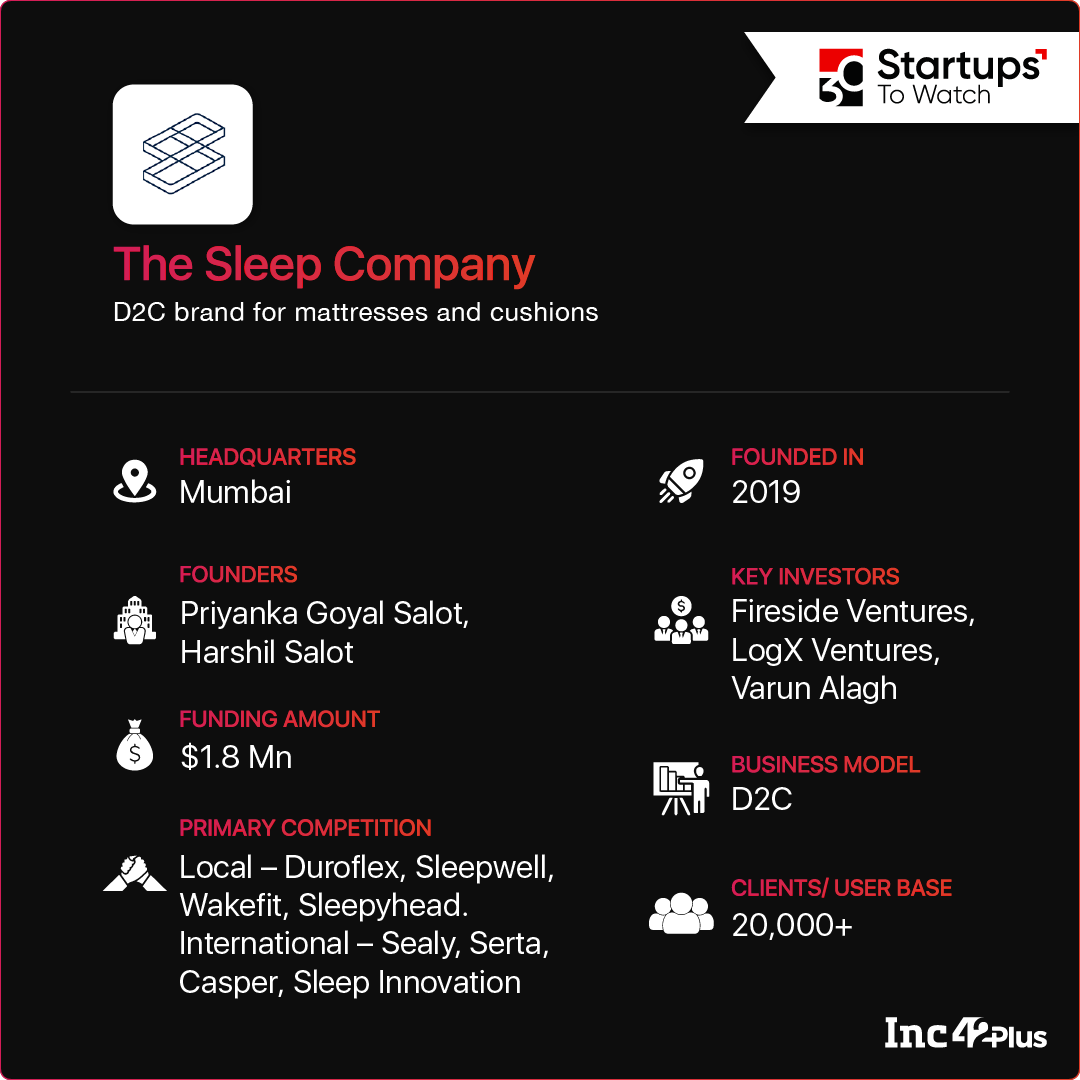
Why The Sleep Company Made It To The List
In 2019, Priyanka Salot was a new mom struggling to get a good night’s sleep, just like millions of other women trying to cope with babycare. The lack of quality sleep was draining her energy and her ability to function efficiently throughout the day. This prompted her to seek the best possible design, innovation and comfort factor a mattress can provide. But unable to find a thoroughly satisfactory product, she and her spouse Harshil decided to set up The Sleep Company, a direct-to-consumer (D2C) brand in the mass-premium segment.
The Mumbai-based startup is a digitally driven sleep solutions and comfort technology company whose products resulted from extensive R&D and collaboration with former DRDO materials scientist AK Tripathi. He invented the Super Stretchy SmartGRID, said to be a hyper-elastic polymer that ensures a superior sleep experience. According to the company, 65% of its revenue comes from the top 35 cities in India, and it has seen 10x growth in the post-Covid times compared to the pre-Covid era. It also claims to be on course to achieve INR 100 Cr annual recurring revenue in the next 18-24 months and aims to reach INR 500 Cr in the next four-five years.
The ‘sleep’ startup is currently integrating its grid technology with a broader range of products. Its product road map also includes entering the ergonomic furniture space, focussing on chairs, especially workplace seating, and beds.
Uvi Health
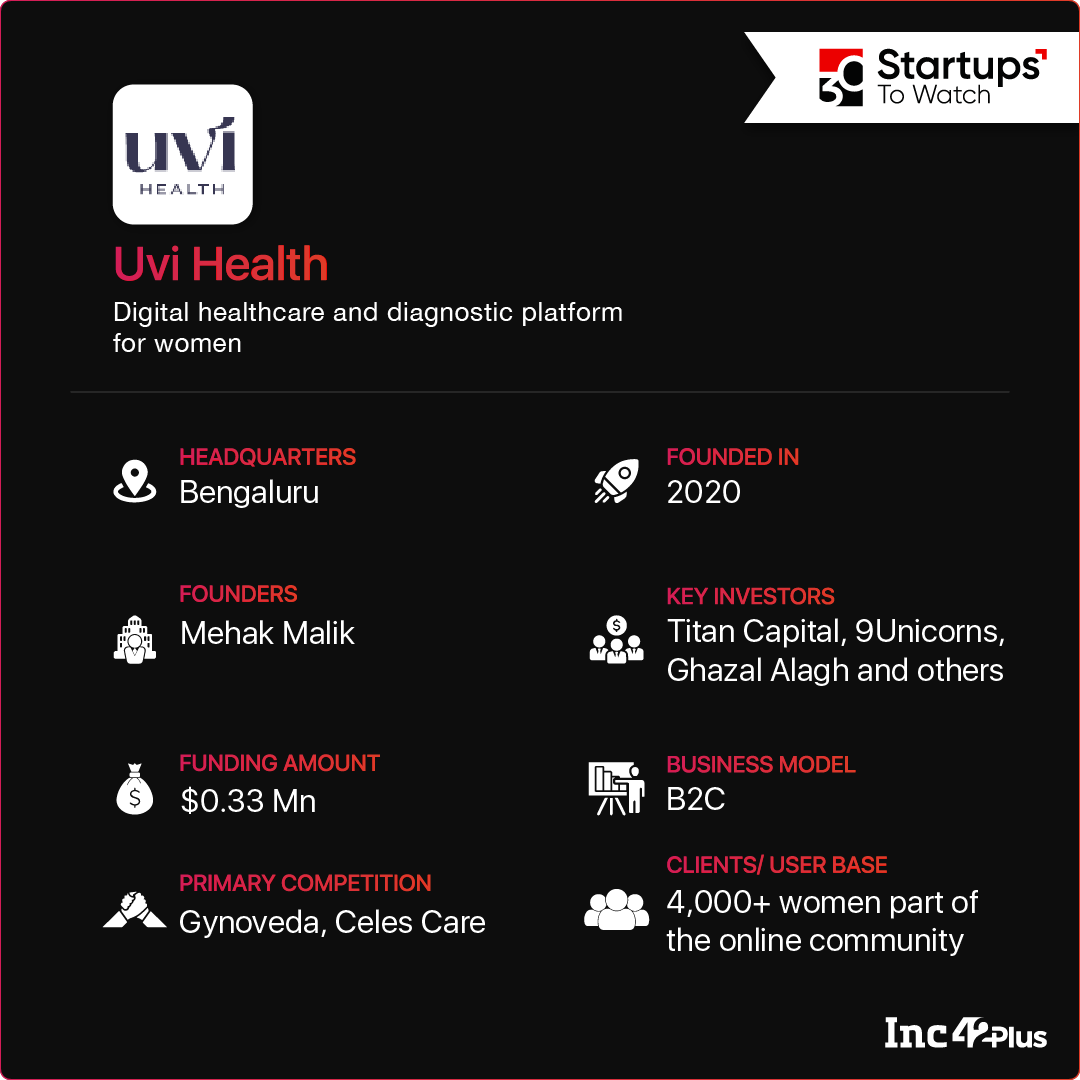
Why Uvi Health Made It To The List
Polycystic ovary syndrome, or PCOS, is one of the most common endocrine disorders among Indian women of reproductive age (15-44 years). Besides, data from the All India Institute Of Medical Sciences (AIIMS) also reveals that one in four women suffers from this condition. Similar health issues like endometriosis and sexual or pelvic health dysfunctions are uncommon either. But few women in the country feel happy about the gynaecological treatment they get outside pregnancy due to social stigma, medical apathy and lack of R&D, among other reasons. However, Bengaluru-based Uvi Health is trying to bridge this gap.
Founded in 2020, the startup has simplified the healthcare regime for women suffering from chronic sexual or and reproductive health disorders by developing science-backed support programmes vetted by a team of specialists. At Uvi, users get an end-to-end experience, right from live consultation, diagnosis and treatment to fitness programmes, mental health support and lifestyle modifications, all under one roof and delivered online. Currently, 4,000+ women are part of Uvi Health’s online community on Instagram and Facebook.
The healthcare startup with a holistic approach will soon develop a mobile platform and scale up its PCOS programme. It is now actively hiring to strengthen its team across product and engineering, operations, marketing and sales.
Windo
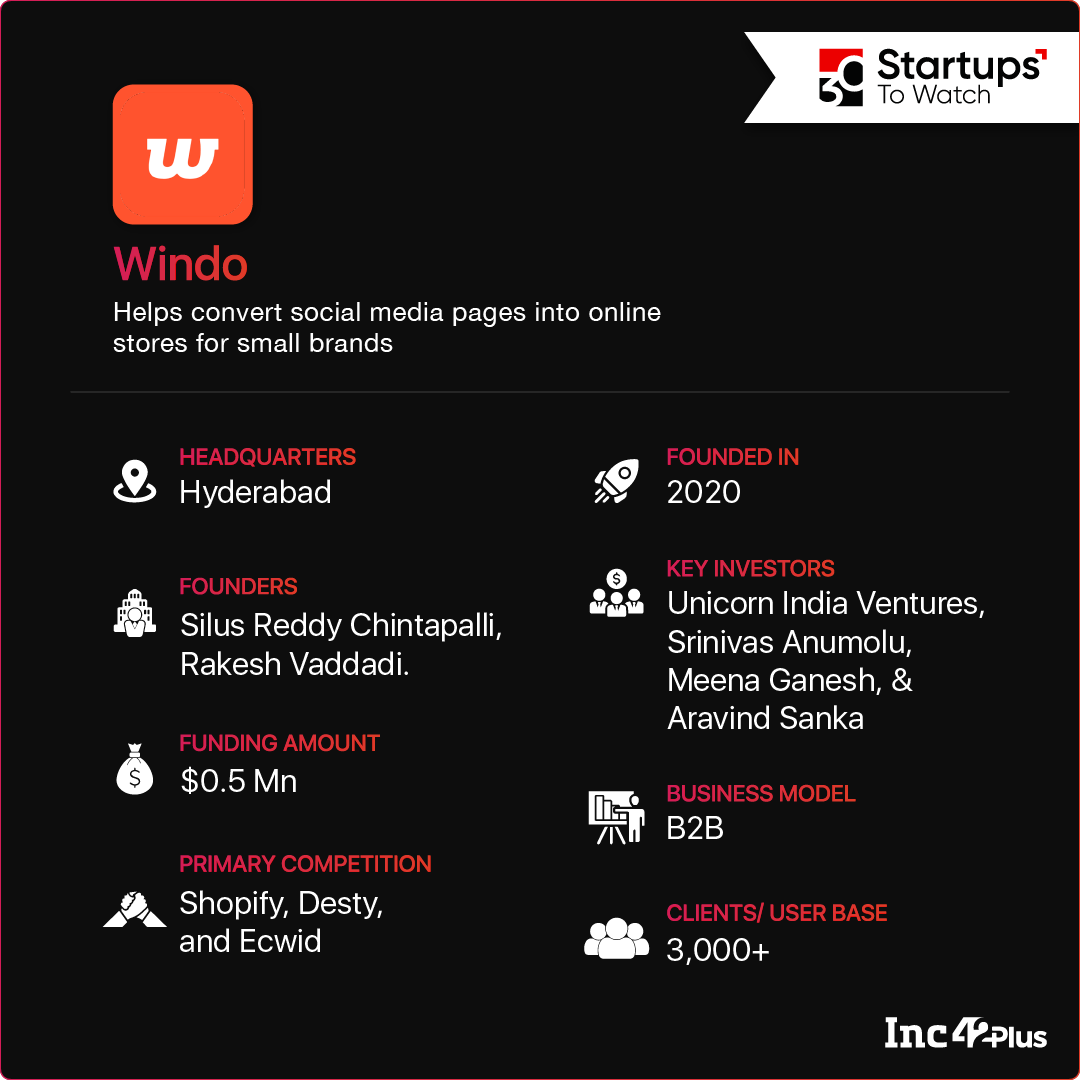
Why Windo Made It To The List
How many brands do we see every day when scrolling through Instagram? Quite a few small brands and single-person businesses leverage this platform and its user base to reach their target audience. However, internet-savvy users are still wary of buying directly from Instagram accounts as these do not feature well-designed shopping interfaces. Consequently, small businesses tend to suffer as they cannot afford attractive, dedicated websites for marketing and sales. This is a familiar story, but in 2020, Hyderabad-based Windo was set up to address this concern.
Simply put, Windo is a web storefront builder and caters to SMBs and solopreneurs who rely on social media for online sales. Besides a web interface, the startup offers a host of technology solutions, including online payments, discount coupons, order and customer management tools, logistics development, tax management and more, so that small companies selling on social media can scale their online businesses. Windo has a freemium SaaS model in place where a basic store is provided free of cost, but a premium one with certain tech features costs about $10 a month. Its target consumer base includes small business owners, solopreneurs, content creators and influencers.
In 2021, the startup wants to focus on finding the right product-market fit. In the long run, it plans to go global and offer its solutions in overseas markets.

